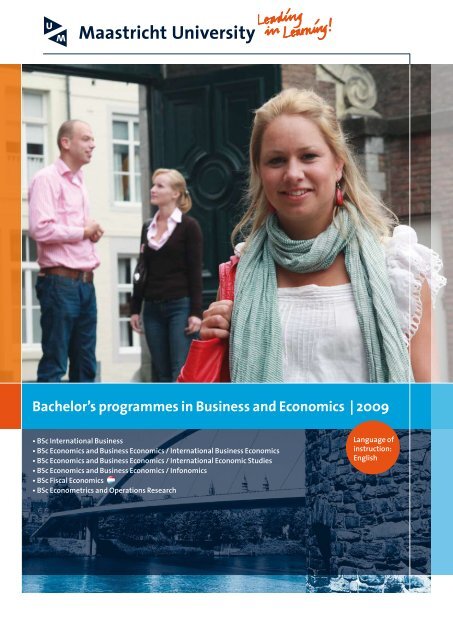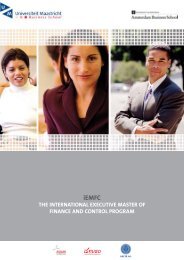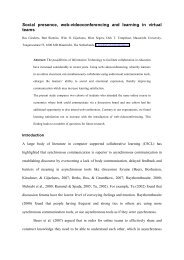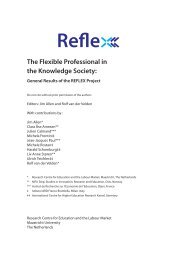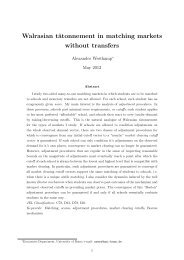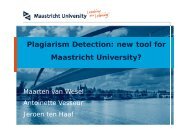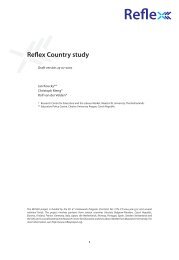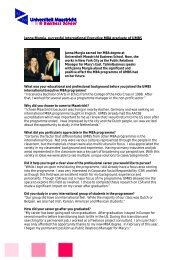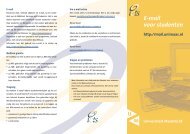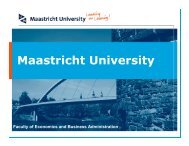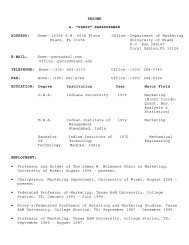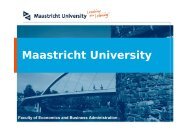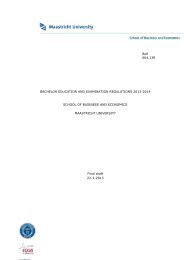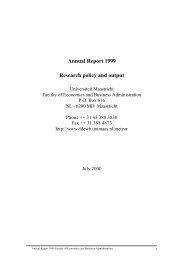Bachelor's programmes in Business and Economics | 2009
Bachelor's programmes in Business and Economics | 2009
Bachelor's programmes in Business and Economics | 2009
You also want an ePaper? Increase the reach of your titles
YUMPU automatically turns print PDFs into web optimized ePapers that Google loves.
Bachelor’s <strong>programmes</strong> <strong>in</strong> Bus<strong>in</strong>ess <strong>and</strong> <strong>Economics</strong> | <strong>2009</strong><br />
• BSc International Bus<strong>in</strong>ess<br />
• BSc <strong>Economics</strong> <strong>and</strong> Bus<strong>in</strong>ess <strong>Economics</strong> / International Bus<strong>in</strong>ess <strong>Economics</strong><br />
• BSc <strong>Economics</strong> <strong>and</strong> Bus<strong>in</strong>ess <strong>Economics</strong> / International Economic Studies<br />
• BSc <strong>Economics</strong> <strong>and</strong> Bus<strong>in</strong>ess <strong>Economics</strong> / Infonomics<br />
• BSc Fiscal <strong>Economics</strong><br />
• BSc Econometrics <strong>and</strong> Operations Research<br />
Language of<br />
<strong>in</strong>struction:<br />
English
2 Bachelor’s <strong>programmes</strong> <strong>in</strong> Bus<strong>in</strong>ess <strong>and</strong> <strong>Economics</strong> | <strong>2009</strong> 1<br />
Contents<br />
Message from the dean 2<br />
Maastricht 3<br />
Maastricht University 4<br />
The Faculty of <strong>Economics</strong> <strong>and</strong> Bus<strong>in</strong>ess Adm<strong>in</strong>istration 6<br />
BSc International Bus<strong>in</strong>ess 17<br />
BSc <strong>Economics</strong> <strong>and</strong> Bus<strong>in</strong>ess <strong>Economics</strong> 21<br />
BSc <strong>Economics</strong> <strong>and</strong> Bus<strong>in</strong>ess <strong>Economics</strong> / International Bus<strong>in</strong>ess <strong>Economics</strong> 22<br />
BSc <strong>Economics</strong> <strong>and</strong> Bus<strong>in</strong>ess <strong>Economics</strong> / International Economic Studies 24<br />
BSc <strong>Economics</strong> <strong>and</strong> Bus<strong>in</strong>ess <strong>Economics</strong> / Infonomics 26<br />
BSc Fiscal <strong>Economics</strong> 29<br />
BSc Econometrics <strong>and</strong> Operations Research 33<br />
Application procedure <strong>and</strong> deadl<strong>in</strong>es 36<br />
Preparation 38<br />
F<strong>in</strong>ancial matters 39<br />
Maastricht University is signatory of the “Code of conduct with respect to<br />
<strong>in</strong>ternational students <strong>in</strong> Dutch higher education”. More <strong>in</strong>formation about<br />
this code of conduct is available at www.<strong>in</strong>ternationalstudy.nl.<br />
All <strong>programmes</strong> <strong>in</strong> this brochure are accredited by the Accreditation<br />
Organisation of the Netherl<strong>and</strong>s <strong>and</strong> Fl<strong>and</strong>ers (NVAO). For more <strong>in</strong>formation<br />
on NVAO, please visit www.nvao.nl.
Message from the dean Maastricht<br />
You are ambitious. Your goal is to ga<strong>in</strong> qualifications<br />
recognised as the best worldwide. And you want to pursue<br />
your ambition at a top school <strong>in</strong> a vibrant environment<br />
where motivated students from all over the world benefit<br />
from top-of-class teach<strong>in</strong>g <strong>and</strong> learn<strong>in</strong>g methods. If these<br />
are your goals, then Maastricht University is def<strong>in</strong>itely the<br />
right choice for you. The Faculty of <strong>Economics</strong> <strong>and</strong> Bus<strong>in</strong>ess<br />
Adm<strong>in</strong>istration offers you the chance to learn from the<br />
best: lead<strong>in</strong>g authorities <strong>in</strong> research <strong>and</strong> education with a<br />
reputation for academic excellence.<br />
There are many features that make Maastricht University a<br />
unique place to live <strong>and</strong> study. Possibly the most important<br />
is its <strong>in</strong>ternationalism: our students come from countries<br />
far <strong>and</strong> wide; our teach<strong>in</strong>g staff is diverse; our <strong>programmes</strong><br />
all have an <strong>in</strong>ternational focus; we have l<strong>in</strong>ks to companies<br />
<strong>and</strong> <strong>in</strong>stitutions <strong>in</strong> other countries; <strong>and</strong> almost all courses<br />
are taught <strong>in</strong> English.<br />
Maastricht University is famous for its pioneer<strong>in</strong>g learn<strong>in</strong>g<br />
methodology. Small tutorial groups <strong>and</strong> a personal<br />
academic relationship with your teachers ensure that you<br />
get the most out of your learn<strong>in</strong>g experience. This applies<br />
whether you are a prospective bachelor’s or master’s<br />
student; of course, we also offer courses at postgraduate,<br />
executive <strong>and</strong> doctorate level. If you choose to apply to<br />
Maastricht University, we hope your time here will be<br />
challeng<strong>in</strong>g <strong>and</strong> motivat<strong>in</strong>g, but also fun.<br />
Our reputation has also been hallmarked by the prestigious<br />
Triple Crown accreditation. The faculty is proud to be one<br />
of a very select group of around 1% of bus<strong>in</strong>ess schools<br />
worldwide to be accredited by the European Foundation<br />
for Management Development (EQUIS), the Association to<br />
Advance Collegiate Schools of Bus<strong>in</strong>ess (AACSB) <strong>and</strong> the<br />
Association of MBAs (AMBA).<br />
Last but not least, the city of Maastricht itself offers<br />
you a cosmopolitan place to live, which is steeped <strong>in</strong><br />
European history. Beautiful <strong>and</strong> charm<strong>in</strong>g, there really is<br />
no better place to soak up student life <strong>and</strong> prepare for your<br />
professional career.<br />
On behalf of all the faculty staff, I hope this brochure<br />
provides you with a good start<strong>in</strong>g po<strong>in</strong>t for <strong>in</strong>formation<br />
about Maastricht, the university, the faculty, our<br />
<strong>programmes</strong> <strong>and</strong> the details of our academic offer<strong>in</strong>g.<br />
We look forward to welcom<strong>in</strong>g you here.<br />
Prof. Jos Lemm<strong>in</strong>k<br />
Dean of the Faculty of <strong>Economics</strong> <strong>and</strong> Bus<strong>in</strong>ess<br />
Adm<strong>in</strong>istration<br />
International <strong>and</strong> <strong>in</strong>novative<br />
Maastricht <strong>and</strong> its university are truly <strong>in</strong>ternational.<br />
Located on the River Meuse, we are at the meet<strong>in</strong>g po<strong>in</strong>t of<br />
the Netherl<strong>and</strong>s, Belgium <strong>and</strong> Germany. Maastricht is just<br />
a stone’s throw from cities such as Brussels, Liege, Aachen,<br />
Cologne, <strong>and</strong> Düsseldorf, while Amsterdam, Paris <strong>and</strong><br />
London are all with<strong>in</strong> a couple of hundred kilometres. As<br />
you stroll through its cobbled streets, you’ll hear dozens of<br />
different languages.<br />
Unsurpris<strong>in</strong>gly, our city has become synonymous with<br />
Europe <strong>and</strong> the European Union, especially follow<strong>in</strong>g<br />
the sign<strong>in</strong>g of the Maastricht Treaty <strong>in</strong> 1992. Maastricht<br />
University reflects that <strong>in</strong>ternational orientation. If you<br />
choose to study here, you will come <strong>in</strong>to contact with<br />
students <strong>and</strong> professors from all over the world. You will<br />
also have the opportunity to <strong>in</strong>tern <strong>and</strong> ga<strong>in</strong> experience at<br />
European <strong>in</strong>stitutions <strong>and</strong> <strong>in</strong>ternational bus<strong>in</strong>esses.<br />
Although Maastricht’s population of around 120,000 is<br />
relatively small, the city has a rich history, culture <strong>and</strong> social<br />
life, as well as plenty of opportunities for outdoor activities. In<br />
parallel, its reputation for <strong>in</strong>novation <strong>in</strong> the fields of science,<br />
technology <strong>and</strong> the arts have put it at the forefront of Europe.<br />
In the same way that Maastricht is safe yet vibrant, the faculty<br />
offers a secure yet challeng<strong>in</strong>g learn<strong>in</strong>g environment. Take the<br />
opportunity to live, work <strong>and</strong> study <strong>in</strong> this stimulat<strong>in</strong>g, unique<br />
<strong>and</strong> <strong>in</strong>ternational city.<br />
2 Bachelor’s <strong>programmes</strong> <strong>in</strong> Bus<strong>in</strong>ess <strong>and</strong> <strong>Economics</strong> | <strong>2009</strong> 3
Maastricht University<br />
Diverse <strong>and</strong> dynamic<br />
Founded <strong>in</strong> 1976, Maastricht is the youngest university <strong>in</strong><br />
the Netherl<strong>and</strong>s, but it has already achieved a reputation<br />
for excellence <strong>in</strong> academic <strong>programmes</strong> <strong>and</strong> learn<strong>in</strong>g<br />
methods. The <strong>in</strong>ternational calibre of you, its students,<br />
gives the university its vitality, diversity <strong>and</strong> dynamism.<br />
A unique learn<strong>in</strong>g approach<br />
Maastricht University has become famous for its approach<br />
to learn<strong>in</strong>g <strong>and</strong> teach<strong>in</strong>g. As a student here, you will benefit<br />
from small classes of only 12 to 14 students, close work<strong>in</strong>g<br />
relationships with your teachers <strong>and</strong> a highly <strong>in</strong>teractive<br />
style of learn<strong>in</strong>g.<br />
Our approach to the learn<strong>in</strong>g process <strong>in</strong>volves the use of<br />
real-life cases <strong>in</strong> the classroom. This method has several<br />
unique features: it br<strong>in</strong>gs you to academic resources<br />
actively, rather than through passively listen<strong>in</strong>g to lectures<br />
or read<strong>in</strong>g papers. It provides you with practical, concrete<br />
examples of the academic theory you study. It allows<br />
you to <strong>in</strong>teract with your peers <strong>and</strong> teachers, giv<strong>in</strong>g you<br />
immediate feedback on your learn<strong>in</strong>g process. And it<br />
means that you develop your own deeper, more personal<br />
underst<strong>and</strong><strong>in</strong>g of the concepts. While your teachers are on<br />
h<strong>and</strong> to facilitate, the responsibility for learn<strong>in</strong>g is yours.<br />
Tra<strong>in</strong><strong>in</strong>g the best future graduates<br />
The benefits of this learn<strong>in</strong>g approach, more commonly<br />
known as ‘problem-based learn<strong>in</strong>g’, are multiple.<br />
• You are learn<strong>in</strong>g cont<strong>in</strong>uously – unlike the lecture-<br />
based approach at some universities, learn<strong>in</strong>g takes<br />
place throughout the whole course, not just before<br />
exam time.<br />
• You get out what you put <strong>in</strong> – the courses are challeng<strong>in</strong>g<br />
<strong>and</strong> dem<strong>and</strong><strong>in</strong>g, but more effort equates with better<br />
results.<br />
• You ga<strong>in</strong> a better idea of the value of knowledge,<br />
through tak<strong>in</strong>g responsibility for your own, <strong>and</strong> others’,<br />
learn<strong>in</strong>g experiences.<br />
• You ga<strong>in</strong> an underst<strong>and</strong><strong>in</strong>g of your own learn<strong>in</strong>g<br />
processes, becom<strong>in</strong>g more aware of what works for you.<br />
• You learn valuable ‘real-life’ management skills:<br />
manag<strong>in</strong>g yourself, others, resources <strong>and</strong> situations.<br />
• Group work affords the potential for conflict situations<br />
you may need to h<strong>and</strong>le the clash of diverse op<strong>in</strong>ions<br />
<strong>and</strong> cultures.<br />
• You learn to meet deadl<strong>in</strong>es <strong>and</strong> produce deliverables,<br />
such as PowerPo<strong>in</strong>t presentations, reports <strong>and</strong> research<br />
projects.<br />
• You learn to make decisions as well as to reflect on the<br />
way you made them.<br />
• You benefit from the freedom to develop your own<br />
<strong>in</strong>terests.<br />
It goes without say<strong>in</strong>g that these advantages will carry<br />
you forward <strong>in</strong> your future career. Time management,<br />
management of yourself <strong>and</strong> others, the ability to give<br />
<strong>and</strong> receive constructive criticism, deal<strong>in</strong>g with conflict<br />
situations: all are characteristics of desirable employees.<br />
Maastricht University graduates have been evaluated by<br />
companies for whom they work. They stated that graduate<br />
competencies <strong>in</strong> personal <strong>and</strong> team management, risktak<strong>in</strong>g<br />
<strong>and</strong> decision-mak<strong>in</strong>g skills are higher than those<br />
from other universities. Our graduates are generally<br />
thought to be more mature <strong>and</strong> entrepreneurial than<br />
others, with the ambition to build their own careers <strong>and</strong> to<br />
take every opportunity to learn.<br />
Constant improvement<br />
An outst<strong>and</strong><strong>in</strong>g choice<br />
“Maastricht University was one of the best academic<br />
choices I’ve ever made. It provides a unique <strong>and</strong><br />
enrich<strong>in</strong>g academic environment that takes<br />
learn<strong>in</strong>g to the highest level through small studentto-professor<br />
ratios, a learn<strong>in</strong>g approach which<br />
maximises student <strong>in</strong>teraction <strong>and</strong> critical th<strong>in</strong>k<strong>in</strong>g<br />
<strong>and</strong>, above all, a population of students from<br />
across the globe who contribute their valuable <strong>and</strong><br />
diverse professional <strong>and</strong> academic experience to the<br />
classroom.”<br />
Rebecca Galloway, United States<br />
International Bus<strong>in</strong>ess student<br />
Although this learn<strong>in</strong>g method has become world-renowned,<br />
the teachers at Maastricht University are cont<strong>in</strong>uously<br />
carry<strong>in</strong>g out research <strong>in</strong>to the methodology so that you<br />
benefit from the most up-to-date developments. All teachers<br />
are tra<strong>in</strong>ed <strong>in</strong> this learn<strong>in</strong>g method, with follow-up specialised<br />
courses enabl<strong>in</strong>g your teachers to improve their skills<br />
cont<strong>in</strong>ually.<br />
Maastricht University monitors its graduates’ progress <strong>in</strong> the<br />
job market after six months, two years <strong>and</strong> five years. We<br />
also develop new learn<strong>in</strong>g <strong>in</strong>itiatives to meet the chang<strong>in</strong>g<br />
needs of the labour market, <strong>and</strong> then implement these <strong>in</strong> the<br />
learn<strong>in</strong>g environment. This means that you will benefit from<br />
cont<strong>in</strong>uously improv<strong>in</strong>g <strong>programmes</strong>, courses <strong>and</strong> ways of<br />
learn<strong>in</strong>g.<br />
4 Bachelor’s <strong>programmes</strong> <strong>in</strong> Bus<strong>in</strong>ess <strong>and</strong> <strong>Economics</strong> | <strong>2009</strong><br />
5
The Faculty of <strong>Economics</strong> <strong>and</strong> Bus<strong>in</strong>ess Adm<strong>in</strong>istration<br />
Academic excellence<br />
Maastricht University’s Faculty of <strong>Economics</strong> <strong>and</strong> Bus<strong>in</strong>ess<br />
Adm<strong>in</strong>istration is well known for the quality of its academic<br />
education <strong>and</strong> research, both with<strong>in</strong> the Netherl<strong>and</strong>s <strong>and</strong><br />
<strong>in</strong>ternationally. All except one bachelor’s programme, Fiscal<br />
<strong>Economics</strong>, are taught <strong>in</strong> English, allow<strong>in</strong>g you to study not<br />
just at an <strong>in</strong>ternationally reputed university, but also <strong>in</strong> an<br />
<strong>in</strong>ternational language.<br />
Internationally accredited <strong>and</strong><br />
highly ranked<br />
The Faculty of <strong>Economics</strong> <strong>and</strong> Bus<strong>in</strong>ess Adm<strong>in</strong>istration<br />
has been recognised by several external, <strong>in</strong>dependent<br />
organisations for the quality of its teach<strong>in</strong>g staff, worldrenowned<br />
learn<strong>in</strong>g methodology, academic excellence,<br />
research <strong>and</strong> facilities. A bachelor’s degree from the faculty<br />
is a passport to your future: reputed <strong>and</strong> recognised<br />
<strong>in</strong>ternationally, our rank<strong>in</strong>gs <strong>and</strong> accreditations are proof<br />
that you’re receiv<strong>in</strong>g the best possible quality of education.<br />
The top reputation of your degree will enhance your career<br />
opportunities around the world.<br />
A top-ranked school of economics <strong>and</strong> bus<strong>in</strong>ess<br />
“The Triple Crown accreditation from EQUIS, AACSB<br />
<strong>and</strong> AMBA confirms once more that the educational<br />
<strong>programmes</strong> <strong>and</strong> related services at the Faculty of<br />
<strong>Economics</strong> <strong>and</strong> Bus<strong>in</strong>ess Adm<strong>in</strong>istration are truly<br />
world class.”<br />
Zijun Jiang, Ch<strong>in</strong>a<br />
Alumnus, Lecturer <strong>in</strong> General <strong>Economics</strong> at Maastricht<br />
University, the Netherl<strong>and</strong>s<br />
Accreditation Organisation<br />
of the Netherl<strong>and</strong>s <strong>and</strong><br />
Fl<strong>and</strong>ers (NVAO)<br />
All bachelor’s <strong>and</strong> master’s <strong>programmes</strong> at the faculty<br />
have been accredited by the NVAO, the Flemish-Dutch<br />
accreditation agency for academic education. Maastricht<br />
University has also been accredited by the NVAO for<br />
its research master’s <strong>programmes</strong> <strong>in</strong> both economics<br />
<strong>and</strong> bus<strong>in</strong>ess science. This <strong>in</strong>dependent organisation<br />
acknowledges the content of the <strong>programmes</strong> <strong>and</strong> the<br />
research quality of the teachers.<br />
www.nvao.net<br />
Association to Advance<br />
Collegiate Schools of<br />
Bus<strong>in</strong>ess (AASCB)<br />
We are one of approximately 40 European <strong>in</strong>stitutions to<br />
have been <strong>in</strong>ternationally accredited by this prestigious US<br />
association, which is considered the hallmark of excellence<br />
<strong>in</strong> management education.<br />
www.aacsb.edu<br />
Beta Gamma Sigma Honor Society<br />
We are proud to have a chapter of the Beta Gamma Sigma<br />
(BGS) Honor Society at the faculty. This is a prestigious<br />
<strong>in</strong>ternational bus<strong>in</strong>ess society to which only AACSBaccredited<br />
universities are <strong>in</strong>vited to provide members.<br />
Membership is open to the very best <strong>in</strong> bus<strong>in</strong>ess, which<br />
means those who graduate with a grade po<strong>in</strong>t average of<br />
8.5. Achiev<strong>in</strong>g this honour not only signifies recognition<br />
of outst<strong>and</strong><strong>in</strong>g academic achievement; it also provides<br />
network<strong>in</strong>g <strong>and</strong> career opportunities.<br />
www.betagammasigma.org<br />
European Quality<br />
Improvement System (EQUIS)<br />
The European Foundation for Management Development<br />
awarded the faculty the EQUIS quality stamp, a lead<strong>in</strong>g<br />
<strong>in</strong>ternational system of quality assessment, improvement<br />
<strong>and</strong> accreditation of higher education <strong>in</strong>stitutions <strong>in</strong><br />
management <strong>and</strong> bus<strong>in</strong>ess adm<strong>in</strong>istration.<br />
www.efmd.org<br />
Association of MBAs (AMBA)<br />
AMBA accreditation of the MBA degrees at the faculty<br />
means that we have been <strong>in</strong>ternationally recognised for<br />
best practice <strong>in</strong> our MBA <strong>programmes</strong>.<br />
www.mbaworld.com<br />
Choice Guide for Higher Education<br />
(Keuzegids Hoger Onderwijs)<br />
This authoritative national evaluation guide ranked<br />
the International Bus<strong>in</strong>ess programme first <strong>in</strong> 2008, a<br />
top spot that the programme has held for several years<br />
now. The <strong>Economics</strong>, Econometrics <strong>and</strong> Fiscal <strong>Economics</strong><br />
<strong>programmes</strong> have also been ranked first based on last<br />
year’s assessment.<br />
www.keuzegids.org<br />
6 Bachelor’s <strong>programmes</strong> <strong>in</strong> Bus<strong>in</strong>ess <strong>and</strong> <strong>Economics</strong> | <strong>2009</strong> 7<br />
Elsevier<br />
The lead<strong>in</strong>g Dutch bus<strong>in</strong>ess magaz<strong>in</strong>e Elsevier has awarded<br />
the faculty’s <strong>Economics</strong> <strong>and</strong> International Bus<strong>in</strong>ess<br />
<strong>programmes</strong> the number one spot for several years<br />
runn<strong>in</strong>g.<br />
www.elsevier.com<br />
F<strong>in</strong>ancial Times<br />
The F<strong>in</strong>ancial Times ranked the International Bus<strong>in</strong>ess<br />
programme 28th <strong>in</strong> the top 40 such <strong>programmes</strong> offered<br />
at European <strong>in</strong>stitutions. The faculty climbed as high as the<br />
third place <strong>in</strong> the category ‘value for money’.<br />
rank<strong>in</strong>gs.ft.com/masters-<strong>in</strong>-management<br />
Centre for Higher Education Development (CHE)<br />
The faculty’s <strong>Economics</strong> programme ranked top <strong>in</strong> 12 out<br />
of 13 criteria measur<strong>in</strong>g student satisfaction us<strong>in</strong>g this<br />
German <strong>in</strong>teractive rank<strong>in</strong>g system. The International<br />
Bus<strong>in</strong>ess programme also ranked highly.<br />
rank<strong>in</strong>g.zeit.de
The right choice<br />
Close connections to the<br />
corporate world<br />
A bachelor’s degree from the Faculty of <strong>Economics</strong> <strong>and</strong><br />
Bus<strong>in</strong>ess Adm<strong>in</strong>istration is already a great spr<strong>in</strong>gboard<br />
for your future career. However, the university boasts<br />
many other l<strong>in</strong>ks to the corporate world <strong>in</strong> which you<br />
can participate.<br />
SME Portal<br />
The SME Portal br<strong>in</strong>gs together students look<strong>in</strong>g for<br />
assignments <strong>and</strong> research projects with<strong>in</strong> small <strong>and</strong><br />
medium-sized companies <strong>and</strong> companies look<strong>in</strong>g for<br />
extra help <strong>and</strong> expertise <strong>in</strong> or around the Maastricht<br />
area, <strong>in</strong>clud<strong>in</strong>g Belgium, France <strong>and</strong> Germany. Most of<br />
the projects are short term, which means they are easy to<br />
comb<strong>in</strong>e with study<strong>in</strong>g.<br />
www.unimaas.nl/mkbportal<br />
Alumni Network<br />
The Alumni Network is made up of some 7,500 graduates<br />
from the faculty who now work <strong>in</strong> companies worldwide.<br />
The network allows not just alumni but also current<br />
students <strong>and</strong> other members of the faculty to keep <strong>in</strong><br />
touch via ‘alumni circles’ <strong>in</strong> the Netherl<strong>and</strong>s, Belgium,<br />
Germany, the UK, the US <strong>and</strong> Ch<strong>in</strong>a.<br />
www.alumni.unimaas.nl<br />
“The ma<strong>in</strong> reason I decided to study <strong>in</strong> Maastricht is<br />
because the university is the most <strong>in</strong>ternational <strong>in</strong><br />
the Netherl<strong>and</strong>s. I already knew that I wanted to go<br />
abroad after my studies, <strong>and</strong> Maastricht fitted these<br />
plans. Furthermore, the learn<strong>in</strong>g approach forces you to<br />
th<strong>in</strong>k about <strong>and</strong> use the <strong>in</strong>formation that you gather.<br />
Maastricht’s relaxed atmosphere, many bars <strong>and</strong><br />
restaurants, <strong>and</strong> the beautiful nature surround<strong>in</strong>g the<br />
city make it one of the best places to spend your life as a<br />
student!”<br />
Marc van der Chijs, the Netherl<strong>and</strong>s<br />
Alumnus, Co-founder <strong>and</strong> board member of Todou.com,<br />
CEO of Spill Group Asia, Angel <strong>in</strong>vestor <strong>in</strong> Ch<strong>in</strong>ese<br />
start-ups, Ch<strong>in</strong>a<br />
Career Services<br />
The university’s career centre is on h<strong>and</strong> to provide you<br />
with advice on your study choices <strong>and</strong> career opportunities.<br />
To get ahead <strong>in</strong> the employment market, you can benefit<br />
from <strong>in</strong>terview tra<strong>in</strong><strong>in</strong>g <strong>and</strong> feedback on your CV <strong>and</strong><br />
cover<strong>in</strong>g letters.<br />
www.loopbaancentrum.unimaas.nl<br />
Study associations<br />
As a student of the faculty, there are several active<br />
associations that you can jo<strong>in</strong>. Initiated by students<br />
themselves, they are l<strong>in</strong>ked to various <strong>programmes</strong> or<br />
discipl<strong>in</strong>es, <strong>and</strong> provide study support, exposure to real-life<br />
bus<strong>in</strong>ess situations, career advice <strong>and</strong> recruitment events.<br />
• 3MA (Maastricht Management/Organisation<br />
Association) bridges the gap between economic theory<br />
<strong>and</strong> bus<strong>in</strong>ess practice. You can take part <strong>in</strong> events such as<br />
the Maastricht Bus<strong>in</strong>ess Days, 3MA Congress,<br />
Consultancy Day, Commercial Day, <strong>in</strong>-house days,<br />
tra<strong>in</strong><strong>in</strong>g <strong>programmes</strong> <strong>and</strong> recruitment d<strong>in</strong>ners.<br />
www.3ma.nl<br />
• FS Focus organises workshops, congresses, study trips,<br />
company visits <strong>and</strong> recruitment events for students <strong>in</strong> the<br />
fields of account<strong>in</strong>g, control or f<strong>in</strong>ance.<br />
www.fsfocus.nl<br />
• Vectum offers students of econometrics <strong>in</strong>sights <strong>in</strong>to<br />
real-world bus<strong>in</strong>ess situations; you will benefit from<br />
direct l<strong>in</strong>ks with companies through the annual Vectum<br />
Congress, <strong>in</strong>-house days <strong>and</strong> presentation d<strong>in</strong>ners.<br />
www.vectum.nl<br />
• IES Network offers students of <strong>in</strong>fonomics <strong>and</strong><br />
economics lectures on current economic events <strong>and</strong><br />
excursions to economic <strong>in</strong>stitutions.<br />
www.iesnetwork.nl<br />
• First, the Fiscal <strong>Economics</strong> study association, organises<br />
company trips – often abroad – <strong>and</strong> work experience<br />
opportunities.<br />
www.efm-onl<strong>in</strong>e.nl<br />
• Eloquent aims to motivate students from the entire<br />
faculty to ma<strong>in</strong>ta<strong>in</strong> a critical perspective on both their<br />
studies <strong>and</strong> their extracurricular activities. Eloquent<br />
publishes a lively, enterta<strong>in</strong><strong>in</strong>g quarterly magaz<strong>in</strong>e.<br />
www.eloquent.nl<br />
• AIESEC, the world’s largest <strong>in</strong>ternational student<br />
association, offers tools to develop your potential <strong>and</strong><br />
positively impact society. To ga<strong>in</strong> <strong>in</strong>sights <strong>and</strong> knowledge<br />
of cultural differences, foreign languages <strong>and</strong><br />
customs, you can apply for management or development<br />
tra<strong>in</strong>eeships. ‘Make a Move’ career week is a four-day<br />
event that aims to br<strong>in</strong>g students to the labour market.<br />
8 Bachelor’s <strong>programmes</strong> <strong>in</strong> Bus<strong>in</strong>ess <strong>and</strong> <strong>Economics</strong> | <strong>2009</strong> 9<br />
www.aiesec.nl<br />
• Integr<strong>and</strong> offers <strong>in</strong>ternships, work assignments, bus<strong>in</strong>ess<br />
courses <strong>and</strong> other activities that will help familiarise you<br />
with the world of work whilst study<strong>in</strong>g.<br />
www.<strong>in</strong>tegr<strong>and</strong>.nl<br />
• Unipartners is an academic consult<strong>in</strong>g firm work<strong>in</strong>g<br />
on bus<strong>in</strong>ess-oriented projects for various companies.<br />
Get <strong>in</strong>volved <strong>in</strong> market research, company <strong>and</strong> project<br />
evaluations, logistical, strategic, law <strong>and</strong> regulation<br />
projects as well as writ<strong>in</strong>g bus<strong>in</strong>ess plans.<br />
www.unipartners.nl/maastricht<br />
• Research Project Maastricht is an annual project open to,<br />
<strong>and</strong> run by, up to 14 high-potential students. Work<strong>in</strong>g on<br />
a non-profit basis, the team spends three months<br />
(plus one month travell<strong>in</strong>g time) <strong>in</strong> emerg<strong>in</strong>g markets<br />
conduct<strong>in</strong>g research on behalf of Dutch companies.<br />
Through <strong>in</strong>tense contact with the bus<strong>in</strong>ess world, you<br />
will ga<strong>in</strong> valuable work experience <strong>and</strong> learn to come up<br />
with solutions to real-life problems.<br />
www.researchproject.nl<br />
Research Project <strong>in</strong> Indonesia<br />
“Instead of study<strong>in</strong>g abroad, I’m go<strong>in</strong>g to do a<br />
research project <strong>in</strong> Indonesia. I’m one of several<br />
students from other discipl<strong>in</strong>es who have been<br />
contracted to analyse whether it’s profitable for<br />
Western companies to trade with Indonesia. We’re<br />
spend<strong>in</strong>g four months there <strong>and</strong> we’ll get the same<br />
credits we would if we studied abroad, but it’s<br />
a great opportunity <strong>and</strong> a practical way to ga<strong>in</strong><br />
experience.”<br />
Marjole<strong>in</strong> Buss, the Netherl<strong>and</strong>s<br />
International Bus<strong>in</strong>ess student
Excellent education<br />
At the Faculty of <strong>Economics</strong> <strong>and</strong> Bus<strong>in</strong>ess Adm<strong>in</strong>istration,<br />
teach<strong>in</strong>g is as important as research. And the two are<br />
<strong>in</strong>extricably l<strong>in</strong>ked. Lead<strong>in</strong>g researchers <strong>and</strong> scholars<br />
directly contribute to the content of the <strong>programmes</strong> you<br />
will be study<strong>in</strong>g. This means that your education will be<br />
<strong>in</strong>novative, up-to-date <strong>and</strong> relevant to the issues at the<br />
cutt<strong>in</strong>g edge of today’s hot research topics.<br />
Study abroad<br />
All bachelor’s <strong>programmes</strong> (except the BSc Fiscal<br />
<strong>Economics</strong>) require you to study abroad for one semester <strong>in</strong><br />
your third year at one of our 130 partner <strong>in</strong>stitutions. These<br />
<strong>in</strong>clude the Stern School of Bus<strong>in</strong>ess at New York University<br />
(USA), Universidad del Pacífico, Lima (Peru), Università<br />
Commerciale Luigi Bocconi, Milan (Italy), University<br />
of Stellenbosch (South Africa), National University of<br />
S<strong>in</strong>gapore (S<strong>in</strong>gapore) <strong>and</strong> University of Sydney (Australia).<br />
For a complete list of partner universities visit:<br />
www.unimaas.nl/feba<br />
The experience not only allows you to learn from different<br />
sources via different methods of teach<strong>in</strong>g; it also gives<br />
you the opportunity to learn about a different culture <strong>and</strong><br />
potentially to pick up a new language. In some cases, it’s<br />
even possible to do an <strong>in</strong>ternship abroad <strong>in</strong>stead. All of<br />
these opportunities will give you an advantage over other<br />
graduates <strong>in</strong> your future <strong>in</strong>ternational career. Whatever you<br />
choose, you can obta<strong>in</strong> 26 European Credit Transfer System<br />
(ECTS) credits or more towards your degree.<br />
Once you are study<strong>in</strong>g at the faculty, the International<br />
Relations Office will be able to assist you with plann<strong>in</strong>g<br />
your trip abroad.<br />
Honours programme<br />
Designed for excellent students who want to broaden<br />
<strong>and</strong> deepen their knowledge <strong>and</strong> underst<strong>and</strong><strong>in</strong>g, the<br />
honours programme is a supplementary programme that<br />
prepares students to fulfil key roles <strong>in</strong> social <strong>and</strong> scientific<br />
developments. The top 10% of first-year students can apply<br />
at the start of their second year. The honours programme<br />
runs parallel to the regular programme <strong>in</strong> the second<br />
<strong>and</strong> third years. Students <strong>in</strong> the honours programme are<br />
assigned an academic advisor to support them <strong>in</strong> their<br />
academic development.<br />
www.unimaas.nl/feba/honoursprogramme<br />
Double-degree <strong>programmes</strong><br />
Hav<strong>in</strong>g completed your bachelor’s, do you want to further<br />
your career by obta<strong>in</strong><strong>in</strong>g a master’s degree from not one<br />
but two top <strong>in</strong>stitutions? At Maastricht University, you<br />
have the opportunity to do a so-called ‘double-degree<br />
programme’ <strong>in</strong> conjunction with one of our top partner<br />
<strong>in</strong>stitutions. These <strong>in</strong>clude:<br />
• EDHEC Bus<strong>in</strong>ess School, France – at this top bus<strong>in</strong>ess<br />
school, with campuses <strong>in</strong> Lille <strong>and</strong> Nice, you can spend<br />
the last semester of your bachelor’s programme as an<br />
exchange student if you are study<strong>in</strong>g for any bachelor’s<br />
degree at the faculty. You will cont<strong>in</strong>ue with your<br />
master’s programme at EDHEC study<strong>in</strong>g for any of the<br />
<strong>programmes</strong> offered at the <strong>in</strong>stitution. You will<br />
then return to Maastricht to complete your master’s<br />
programme; all <strong>programmes</strong> offered at the faculty are<br />
eligible. The double-degree master’s programme with<br />
EDHEC takes just one year.<br />
• Queen’s School of Bus<strong>in</strong>ess, Canada – at this cutt<strong>in</strong>g-<br />
edge school <strong>in</strong> K<strong>in</strong>gston, you can spend the last semester<br />
of your bachelor’s programme as an exchange student<br />
if you are study<strong>in</strong>g for the bachelor’s programme<br />
International Bus<strong>in</strong>ess or the bachelor’s programme<br />
<strong>Economics</strong> <strong>and</strong> Bus<strong>in</strong>ess <strong>Economics</strong> at the faculty.<br />
You will cont<strong>in</strong>ue with your master’s programme at<br />
Queen’s study<strong>in</strong>g for the master’s programme <strong>in</strong> Global<br />
Management offered at the <strong>in</strong>stitution. You will then<br />
return to Maastricht to complete your master’s<br />
programme; only the master’s programme International<br />
Bus<strong>in</strong>ess – graduate option ‘free master’ is eligible.<br />
The double-degree master’s programme with Queen’s<br />
takes a little over one year, result<strong>in</strong>g <strong>in</strong> m<strong>in</strong>imal study<br />
delay.<br />
• Université catholique de Louva<strong>in</strong>, Belgium – <strong>in</strong> Louva<strong>in</strong>-<br />
la-Neuve you can take part of your master’s programme<br />
at the Université catholique de Louva<strong>in</strong> study<strong>in</strong>g the<br />
Master en sciences économiques orientation générale<br />
à la f<strong>in</strong>alité spécialisée. You will then return to Maastricht<br />
to take the other part of your master’s programme at the<br />
faculty study<strong>in</strong>g the master’s programme International<br />
Economic Studies or the master’s programme<br />
Econometrics an Operations Research. A double-degree<br />
master’s programme with this <strong>in</strong>stitution takes two<br />
years <strong>and</strong> is accessible to bachelor’s graduates from both<br />
the faculty <strong>and</strong> other universities.<br />
All of our partner <strong>in</strong>stitutions have at least two<br />
<strong>in</strong>ternational accreditations (see page 6), are lead<strong>in</strong>g <strong>in</strong> the<br />
economics <strong>and</strong> bus<strong>in</strong>ess fields <strong>in</strong> their country <strong>and</strong> offer<br />
great academic opportunities that represent an additional<br />
benefit for students.<br />
A double-degree programme is dem<strong>and</strong><strong>in</strong>g as well as<br />
reward<strong>in</strong>g. With partner <strong>in</strong>stitutions with which we have<br />
a contract, the same number of students from the partner<br />
<strong>in</strong>stitution as FEBA may be selected to come to Maastricht<br />
to study. Only the students with the strongest academic<br />
records <strong>and</strong> the highest levels of ambition <strong>and</strong> motivation<br />
from both <strong>in</strong>stitutions will be selected!<br />
www.unimaas.nl/doubledegrees<br />
Two excellent degrees<br />
“The double-degree programme provided me<br />
with the opportunity to work on certa<strong>in</strong> areas of<br />
knowledge that I had not yet studied <strong>in</strong> depth at<br />
EDHEC Bus<strong>in</strong>ess School. I am greatly impressed by<br />
the high academic st<strong>and</strong>ard <strong>and</strong> the outst<strong>and</strong><strong>in</strong>g<br />
<strong>in</strong>ternational reputation of the Faculty of <strong>Economics</strong><br />
<strong>and</strong> Bus<strong>in</strong>ess Adm<strong>in</strong>istration. As a result of my<br />
double-degree qualification, I was offered a job at<br />
Merrill Lynch – <strong>and</strong> I have EDHEC <strong>and</strong> FEBA to thank!”<br />
Julien Potier, France<br />
Alumnus, Investment Bank<strong>in</strong>g Analyst at Merrill<br />
Lynch London, United K<strong>in</strong>gdom<br />
10 Bachelor’s <strong>programmes</strong> <strong>in</strong> Bus<strong>in</strong>ess <strong>and</strong> <strong>Economics</strong> | <strong>2009</strong><br />
11
Reputation for research<br />
Good quality research builds the reputation of the<br />
university, which means that your degree is worth more.<br />
Almost all of your teachers also carry out research so you<br />
benefit from the most up-to-date, <strong>in</strong>novative, highest<br />
quality learn<strong>in</strong>g experience. In short, you’re gett<strong>in</strong>g more<br />
than just a textbook education.<br />
There are three unique features that def<strong>in</strong>e the research<br />
be<strong>in</strong>g carried out <strong>in</strong> the faculty. Firstly, the <strong>in</strong>tegration<br />
between bus<strong>in</strong>ess <strong>and</strong> economics def<strong>in</strong>es both the research<br />
<strong>and</strong> the way the <strong>programmes</strong> are structured. Secondly,<br />
both research <strong>and</strong> <strong>programmes</strong> look at their subject matter<br />
from both an external <strong>and</strong> an <strong>in</strong>ternal perspective. For<br />
<strong>in</strong>stance, the programme cover<strong>in</strong>g human resources looks<br />
at external labour markets as well as the <strong>in</strong>ternal structure<br />
of teams. And lastly, characteristic of the faculty is the<br />
blend of applied work <strong>and</strong> fundamental theory. For our<br />
researchers <strong>and</strong> our students, this comb<strong>in</strong>ation is vital.<br />
Key discipl<strong>in</strong>es <strong>in</strong> which research is currently be<strong>in</strong>g carried<br />
out <strong>in</strong>clude:<br />
• Economic theory;<br />
• F<strong>in</strong>ance <strong>and</strong> econometrics;<br />
• Human resource <strong>and</strong> labour markets;<br />
• Technology <strong>and</strong> <strong>in</strong>novation;<br />
• Market<strong>in</strong>g;<br />
• Account<strong>in</strong>g <strong>and</strong> corporate governance;<br />
• Information <strong>and</strong> operations management.<br />
The faculty’s research is regularly assessed by the<br />
Association of Universities <strong>in</strong> the Netherl<strong>and</strong>s (VSNU);<br />
<strong>programmes</strong> have consistently been rated four or five out<br />
of five.<br />
State-of-the-art facilities<br />
University library<br />
Right <strong>in</strong> the centre of Maastricht, just a five-m<strong>in</strong>ute<br />
walk from the faculty, you will f<strong>in</strong>d the state-of-the-art<br />
university library. Its excellent facilities <strong>in</strong>clude:<br />
• an extensive book <strong>and</strong> magaz<strong>in</strong>e collection;<br />
• study areas, with or without computers;<br />
• 320 computers;<br />
• 80 laptop connections;<br />
• an ICT service desk;<br />
• group spaces;<br />
• large tables to spread out your materials;<br />
• different noise levels, from low to absolute silence;<br />
• ergonomically-designed equipment;<br />
• electronic databases;<br />
• a wide range of electronic documents <strong>and</strong> journals –<br />
where licences permit, these can also be accessed from<br />
home as well as other campus locations.<br />
www.ub.unimaas.nl<br />
Student advice<br />
For general study support, look no further than the study<br />
advisors. You can go to them for advice on the structure<br />
<strong>and</strong> organisation of the <strong>programmes</strong>, rules <strong>and</strong> regulations,<br />
plann<strong>in</strong>g or choos<strong>in</strong>g your studies. If, for personal reasons,<br />
you either can’t complete your studies or need more time<br />
to do so, the study advisors are also here to help you.<br />
Language Centre<br />
Your education comprises more than just the academic<br />
discipl<strong>in</strong>e you choose to study. The Language Centre offers<br />
a broad range of affordably-priced language courses from<br />
beg<strong>in</strong>ner to advanced level <strong>in</strong> 13 languages, <strong>in</strong>clud<strong>in</strong>g<br />
English, Dutch, Russian, Arabic <strong>and</strong> Ch<strong>in</strong>ese.<br />
www.languages.unimaas.nl<br />
12 Bachelor’s <strong>programmes</strong> <strong>in</strong> Bus<strong>in</strong>ess <strong>and</strong> <strong>Economics</strong> | <strong>2009</strong> 13
08.30 - 09.30<br />
09.30 - 10.30<br />
10.30 - 11.30<br />
11.30 - 12.30<br />
12.30 - 13.30<br />
13.30 - 14.30<br />
14.30 - 15.30<br />
15.30 - 16.30<br />
16.30 - 17.30<br />
Average week of a first-year student<br />
Monday<br />
Self-study<br />
Self-study<br />
Lecture Quantitative<br />
Methods<br />
Lecture Quantitative<br />
Methods<br />
Lunch<br />
Prepar<strong>in</strong>g tutorial<br />
group<br />
Prepar<strong>in</strong>g tutorial<br />
group<br />
Prepar<strong>in</strong>g tutorial<br />
group<br />
Prepar<strong>in</strong>g tutorial<br />
group<br />
Tuesday<br />
Tutorial Market<strong>in</strong>g &<br />
Organizations<br />
Tutorial Market<strong>in</strong>g &<br />
Organizations<br />
Group work <strong>in</strong><br />
library<br />
Group work <strong>in</strong><br />
library<br />
Group work <strong>in</strong><br />
library<br />
Group work <strong>in</strong><br />
library<br />
Self-study<br />
Self-study<br />
Self-study<br />
Wednesday<br />
Lecture Market<strong>in</strong>g &<br />
Organizations<br />
Lecture Market<strong>in</strong>g &<br />
Organizations<br />
Prepar<strong>in</strong>g tutorial<br />
group<br />
Prepar<strong>in</strong>g tutorial<br />
group<br />
Break<br />
Tutorial Quantitative<br />
Methods<br />
Tutorial Quantitative<br />
Methods<br />
Self-study<br />
Self-study<br />
Thursday<br />
Tutorial Market<strong>in</strong>g &<br />
Organizations<br />
Tutorial Market<strong>in</strong>g &<br />
Organizations<br />
Group work <strong>in</strong><br />
library<br />
Group work <strong>in</strong><br />
library<br />
Group work <strong>in</strong><br />
library<br />
Group work <strong>in</strong><br />
library<br />
Break<br />
Extra tutorial<br />
Quantitative<br />
Methods<br />
Extra tutorial<br />
Quantitative<br />
Methods<br />
Friday<br />
Lecture Quantitative<br />
Methods<br />
Lecture Quantitative<br />
Methods<br />
Self-study<br />
Self-study<br />
Break<br />
Tutorial Quantitative<br />
Methods<br />
Tutorial Quantitative<br />
Methods<br />
There are several different types of courses that you<br />
will follow dur<strong>in</strong>g the course of your degree, whichever<br />
programme you choose. Hav<strong>in</strong>g completed each element,<br />
you will receive a certa<strong>in</strong> number of European Credit Transfer<br />
System (ECTS) credits, which contribute towards a total of 180<br />
for your entire bachelor’s degree (see table below). One credit<br />
represents a study load of 28 hours.<br />
• Skills tra<strong>in</strong><strong>in</strong>g (4 ECTS) – this comprises a short, practical<br />
course usually at the end of each semester.<br />
• Compulsory courses (6.5 ECTS) – all students must follow<br />
certa<strong>in</strong> compulsory courses <strong>in</strong> their first <strong>and</strong> second years.<br />
See course outl<strong>in</strong>es of <strong>in</strong>dividual <strong>programmes</strong> for details of<br />
the compulsory courses that apply to each programme.<br />
• Electives (6.5 ECTS) – <strong>in</strong> your third year, you will be able to<br />
choose from various elective courses that relate to your<br />
specialisation. See course outl<strong>in</strong>es of <strong>in</strong>dividual <strong>programmes</strong><br />
for details of the elective courses that apply to each<br />
specialisation.<br />
• Quantitative methods (4 or 6.5 ECTS) – these courses<br />
provide an <strong>in</strong>troduction to methodological topics that are<br />
quantitative <strong>in</strong> nature: mathematics, statistics <strong>and</strong><br />
computer science.<br />
• Study Abroad (26 ECTS) – with the exception of Fiscal<br />
<strong>Economics</strong> students, all students spend one semester<br />
study<strong>in</strong>g abroad at a partner <strong>in</strong>stitution <strong>in</strong> the third year.<br />
Alternatively, you can do an <strong>in</strong>ternship abroad, worth 26<br />
ECTS.<br />
• Internship (4 ECTS) – you have the opportunity to replace a<br />
skills tra<strong>in</strong><strong>in</strong>g course worth four ECTS credits with an<br />
<strong>in</strong>ternship. As part of the Infonomics programme, you can<br />
even organise an extended <strong>in</strong>ternational <strong>in</strong>ternship <strong>in</strong>stead<br />
of your study abroad.<br />
• Capstone assignment/bachelor’s thesis (4 ECTS) – the<br />
bachelor’s <strong>programmes</strong> end with an <strong>in</strong>dependently written<br />
essay of approx. 4,500-5,000 words, called a capstone<br />
assignment. The topic you choose should be consistent with<br />
your specialisation <strong>and</strong>/or elective. Econometrics <strong>and</strong><br />
Operations Research students must write a bachelor’s thesis<br />
<strong>in</strong>stead.<br />
For more <strong>in</strong>formation, see the study guide at:<br />
www.unimaas.nl/feba/studyguide<br />
14 Bachelor’s <strong>programmes</strong> <strong>in</strong> Bus<strong>in</strong>ess <strong>and</strong> <strong>Economics</strong> | <strong>2009</strong> 15<br />
Restaurant<br />
At Mensa, the faculty’s restaurant, you can buy a wide<br />
range of affordable meals <strong>and</strong> snacks. Every day, you can<br />
choose between two hot meals, a vegetarian dish, salads,<br />
s<strong>and</strong>wiches, dr<strong>in</strong>ks <strong>and</strong> many other delicious options.<br />
Student Services<br />
For student support services not related to your<br />
programme, Student Services is here to help. You can<br />
approach any of the advisors about matters relat<strong>in</strong>g to<br />
registration, studies, professions, career plann<strong>in</strong>g, f<strong>in</strong>ancial<br />
assistance <strong>and</strong> sports.<br />
www.ssc.unimaas.nl<br />
If you are a prospective student from outside the EU,<br />
you can visit the International Service Desk for help<br />
<strong>in</strong> apply<strong>in</strong>g for a visa, open<strong>in</strong>g a Dutch bank account,<br />
f<strong>in</strong>d<strong>in</strong>g accommodation, apply<strong>in</strong>g for <strong>in</strong>surance <strong>and</strong> so on.<br />
The International Service Desk also coord<strong>in</strong>ates several<br />
scholarship <strong>and</strong> grant <strong>programmes</strong>.<br />
The academic year<br />
The academic year is divided <strong>in</strong>to two semesters. Each<br />
semester comprises two periods of eight weeks <strong>and</strong> two<br />
periods of two weeks. Dur<strong>in</strong>g the eight-week periods,<br />
you will follow two courses at the same time. The twoweek<br />
periods are <strong>in</strong>tended for ‘additional’ courses, such<br />
as research methods <strong>and</strong> techniques, tra<strong>in</strong><strong>in</strong>g courses or<br />
skills tra<strong>in</strong><strong>in</strong>g. The content of the first <strong>and</strong> second year is<br />
the same for all students. This period is designed to give<br />
you the academic basis you will need for the rest of the<br />
programme. You will beg<strong>in</strong> to specialise <strong>in</strong> your third year.
“Giv<strong>in</strong>g you the knowledge <strong>and</strong> skills required<br />
for an <strong>in</strong>ternational bus<strong>in</strong>ess career.”<br />
Bachelor of Science <strong>in</strong> International Bus<strong>in</strong>ess<br />
Bus<strong>in</strong>ess without borders<br />
Are you curious about what’s go<strong>in</strong>g on <strong>in</strong> the bus<strong>in</strong>ess world? Do you watch the news <strong>and</strong> want to play<br />
a part <strong>in</strong> creat<strong>in</strong>g it? Do you question how people’s behaviour affects <strong>in</strong>dividual companies, whole<br />
<strong>in</strong>dustries, <strong>and</strong> national <strong>and</strong> <strong>in</strong>ternational economies? Then International Bus<strong>in</strong>ess is made for you.<br />
Why should you choose International Bus<strong>in</strong>ess?<br />
Who you are as a person is as important as what you<br />
know about a topic. That’s why a bachelor’s programme <strong>in</strong><br />
International Bus<strong>in</strong>ess does not just focus on the strategy,<br />
resources, organisation, market<strong>in</strong>g, management, f<strong>in</strong>ance<br />
<strong>and</strong> account<strong>in</strong>g required to make a bus<strong>in</strong>ess run. It also<br />
teaches you the skills you need to put those th<strong>in</strong>gs <strong>in</strong>to<br />
practice – like conflict management, leadership, teamwork,<br />
presentation skills <strong>and</strong> more.<br />
In your first two years, you will follow compulsory courses<br />
<strong>in</strong> a broad range of <strong>in</strong>ternational bus<strong>in</strong>ess areas, such<br />
as logistics, human resources, market<strong>in</strong>g <strong>and</strong> f<strong>in</strong>ance.<br />
All these are essential to mak<strong>in</strong>g a bus<strong>in</strong>ess successful.<br />
For example, Apple’s successful iPod could not have<br />
been produced without a budget to set up a new branch<br />
with<strong>in</strong> the corporation (F<strong>in</strong>ance) <strong>and</strong> the procurement<br />
of raw materials (Supply Cha<strong>in</strong> Management). It needs<br />
people to manage <strong>in</strong>ternal processes (Organisation/<br />
Human Resources) <strong>and</strong> transportation (Supply Cha<strong>in</strong><br />
Management). Furthermore, the company needs<br />
market<strong>in</strong>g <strong>and</strong> sales employees to sell the iPod (Market<strong>in</strong>g)<br />
<strong>and</strong> people to manage the money from those sales<br />
(Account<strong>in</strong>g). An <strong>in</strong>formation system is needed to<br />
provide valuable data to every department (Information<br />
Management). Based on sales <strong>and</strong> profitability figures, the<br />
product is evaluated <strong>and</strong> recommendations for the future<br />
are developed (Strategy).<br />
As part of your third year, you will spend one semester<br />
study<strong>in</strong>g abroad. You’ll also have opportunities to contact<br />
real companies at ‘bus<strong>in</strong>ess days’ organised by study<br />
associations, do research projects <strong>and</strong> follow an <strong>in</strong>ternship,<br />
usually at the end of your bachelor’s programme. If you’re<br />
<strong>in</strong>terested <strong>in</strong> the world of <strong>in</strong>ternational bus<strong>in</strong>ess, this<br />
k<strong>in</strong>d of <strong>in</strong>ternational experience will set you ahead of the<br />
competition.<br />
What will you learn?<br />
Hav<strong>in</strong>g completed this programme, you will be able to:<br />
• underst<strong>and</strong> the ‘value cha<strong>in</strong>’ from <strong>in</strong>put to output (see<br />
iPod example);<br />
• demonstrate an awareness of, <strong>and</strong> confidence <strong>in</strong>,<br />
yourself – your work<strong>in</strong>g style, your reaction to situations<br />
<strong>and</strong> your degree of self-discipl<strong>in</strong>e;<br />
• deal with others, <strong>in</strong> terms of manag<strong>in</strong>g conflict situations,<br />
demonstrat<strong>in</strong>g leadership <strong>and</strong> teamwork skills;<br />
• observe <strong>and</strong> analyse the society <strong>in</strong> which you live, be<strong>in</strong>g<br />
aware of the outside world <strong>in</strong> which companies operate.<br />
Is International Bus<strong>in</strong>ess right for you?<br />
As well as the st<strong>and</strong>ard admission requirements<br />
(see page 36), you should:<br />
• be confident about mak<strong>in</strong>g up your own m<strong>in</strong>d <strong>and</strong><br />
express<strong>in</strong>g your own op<strong>in</strong>ions;<br />
• be will<strong>in</strong>g to contribute to the class, not just passively to<br />
receive <strong>in</strong>formation;<br />
• be <strong>in</strong>quisitive about current affairs <strong>and</strong> what’s go<strong>in</strong>g on<br />
<strong>in</strong> the world <strong>in</strong> general;<br />
• have an <strong>in</strong>terest <strong>in</strong> develop<strong>in</strong>g self-awareness, while<br />
be<strong>in</strong>g able to listen to others;<br />
• be flexible about work<strong>in</strong>g <strong>in</strong> teams with people from<br />
different cultures;<br />
• be curious about people, be it consumers, <strong>in</strong>vestors or<br />
employees;<br />
• have an aff<strong>in</strong>ity for numbers.<br />
16 Bachelor’s <strong>programmes</strong> <strong>in</strong> Bus<strong>in</strong>ess <strong>and</strong> <strong>Economics</strong> | <strong>2009</strong><br />
17
Case International Bus<strong>in</strong>ess: McDonalds’ bus<strong>in</strong>ess philosophy<br />
Over the past few years, McDonalds has been exposed to strong<br />
external <strong>and</strong> <strong>in</strong>ternal pressures. External pressures <strong>in</strong>cluded <strong>in</strong>creased<br />
competition <strong>and</strong> healthier lifestyles. An <strong>in</strong>ternal issue was the corporate<br />
culture designed around mak<strong>in</strong>g money from rent<strong>in</strong>g store locations<br />
to franchisees rather than focus<strong>in</strong>g on sell<strong>in</strong>g fast food. The company<br />
wanted to switch its bus<strong>in</strong>ess philosophy to focus on Customer<br />
Relationship Management (CRM): this analyses customers’ needs, wants<br />
<strong>and</strong> dem<strong>and</strong>s <strong>in</strong> order to create, deliver <strong>and</strong> communicate value.<br />
What are your career prospects?<br />
Around 90% of bachelor’s graduates go on to do a master’s<br />
<strong>in</strong> their chosen area of specialisation. Moreover, the<br />
<strong>in</strong>ternational nature of your bachelor’s programme means<br />
that you could study for your master’s at any number of<br />
<strong>in</strong>ternational universities. The broad subject areas <strong>and</strong><br />
skills that you will learn at Maastricht University will allow<br />
you to work <strong>in</strong> a wide variety of <strong>in</strong>dustries <strong>and</strong> positions.<br />
What you choose will largely depend on your area of<br />
specialisation <strong>and</strong> of course your own <strong>in</strong>terests.<br />
Graduates have found positions <strong>in</strong>:<br />
• mult<strong>in</strong>ationals, such as Shell <strong>and</strong> Daimler AG;<br />
• consultancy firms, such as Cap Gem<strong>in</strong>i <strong>and</strong> Accenture;<br />
• human resource departments;<br />
• market<strong>in</strong>g departments;<br />
• accountancy firms, such as Ernst & Young,<br />
PricewaterhouseCoopers, KPMG, Deloitte Touche<br />
Tohmatsu;<br />
• f<strong>in</strong>ancial <strong>in</strong>stitutions, such as Fortis, Deutsche Bank <strong>and</strong><br />
JP Morgan;<br />
• their own bus<strong>in</strong>esses.<br />
Course outl<strong>in</strong>e<br />
There are certa<strong>in</strong> compulsory courses with<strong>in</strong> this<br />
programme, as well as skills tra<strong>in</strong><strong>in</strong>g <strong>and</strong> electives.<br />
18 Bachelor’s <strong>programmes</strong> <strong>in</strong> Bus<strong>in</strong>ess <strong>and</strong> <strong>Economics</strong> | <strong>2009</strong><br />
19<br />
Year 1<br />
Term 1<br />
2<br />
<strong>Economics</strong><br />
<strong>and</strong> Bus<strong>in</strong>ess<br />
Term 2<br />
Year 2<br />
Term 3<br />
Term 4<br />
Year 3<br />
Term 5<br />
Term 6<br />
1<br />
3<br />
4<br />
5<br />
6<br />
1<br />
2<br />
3<br />
4<br />
5<br />
6<br />
1<br />
2<br />
3<br />
4<br />
5<br />
6<br />
International Bus<strong>in</strong>ess<br />
Management of<br />
Organisations <strong>and</strong><br />
Market<strong>in</strong>g<br />
Account<strong>in</strong>g<br />
Skills Tra<strong>in</strong><strong>in</strong>g: Philosophy of Science<br />
Strategy<br />
F<strong>in</strong>ance<br />
Quantitative<br />
Methods I<br />
Quantitative<br />
Methods II<br />
Fundamentals of<br />
Supply Cha<strong>in</strong><br />
Management<br />
Skills Tra<strong>in</strong><strong>in</strong>g: Management Game<br />
F<strong>in</strong>ance <strong>and</strong><br />
Account<strong>in</strong>g<br />
Global Bus<strong>in</strong>ess<br />
International<br />
Market<strong>in</strong>g<br />
Management<br />
Skills Tra<strong>in</strong><strong>in</strong>g: Quantitative Methods III<br />
Corporate<br />
Governance<br />
Management of<br />
Operations <strong>and</strong> Product<br />
Development<br />
Bus<strong>in</strong>ess<br />
Specialisation<br />
Course<br />
Bus<strong>in</strong>ess<br />
Specialisation<br />
Course<br />
Skills Tra<strong>in</strong><strong>in</strong>g: Elective<br />
Skills Tra<strong>in</strong><strong>in</strong>g: Elective<br />
Study Abroad<br />
Capstone Assignment<br />
Management of<br />
Organisations<br />
Management<br />
Information Systems<br />
Human Resource<br />
Management<br />
1 Bus<strong>in</strong>ess Elective<br />
1 <strong>Economics</strong>,<br />
Quantitative, Law or<br />
Ethics Elective<br />
Fast facts<br />
Fitt<strong>in</strong>g the <strong>in</strong>ternational bill<br />
“I was lucky enough to study abroad for a year at<br />
school, <strong>and</strong> I knew I wanted to cont<strong>in</strong>ue study<strong>in</strong>g <strong>in</strong><br />
another language with people from other cultures.<br />
I also had a lot of <strong>in</strong>terests <strong>and</strong> didn’t yet know<br />
which area I wanted to specialise <strong>in</strong>. International<br />
Bus<strong>in</strong>ess at Maastricht fitted the bill perfectly –<br />
<strong>in</strong>ternationally oriented <strong>in</strong> culture, content <strong>and</strong><br />
language.”<br />
Julie Schre<strong>in</strong>emacher, the Netherl<strong>and</strong>s<br />
International Bus<strong>in</strong>ess student<br />
• Programme title: BSc International Bus<strong>in</strong>ess<br />
• Language of <strong>in</strong>struction: English<br />
• Duration: 3 years full time<br />
• Start date: 1 September <strong>2009</strong><br />
• Available places: 500<br />
• Application deadl<strong>in</strong>es: selection procedure 1 April <strong>2009</strong> (250<br />
places); lottery 15 May <strong>2009</strong> (250 places)<br />
• Study abroad: compulsory <strong>in</strong> the third year, <strong>in</strong> the first or<br />
second semester<br />
• Study load per week: 8 hrs classes; 12 hrs group work; 20 hrs<br />
<strong>in</strong>dividual study. Total 40 hrs.<br />
• Learn<strong>in</strong>g method: problem-based learn<strong>in</strong>g; guest lectures;<br />
presentations; assignments; papers<br />
• Assessment method: written exams; f<strong>in</strong>al papers; group<br />
participation<br />
• You can obta<strong>in</strong> 180 ECTS credits <strong>in</strong> three years<br />
• Cont<strong>in</strong>u<strong>in</strong>g master’s <strong>programmes</strong> at FEBA without<br />
additional admissions requirements:<br />
MSc International Bus<strong>in</strong>ess <strong>and</strong> MSc Management of<br />
Learn<strong>in</strong>g. You can also cont<strong>in</strong>ue your studies with other<br />
master’s <strong>programmes</strong>, but additional requirements may<br />
apply.<br />
Further <strong>in</strong>formation:<br />
• www.unimaas.nl/feba/bachelors<br />
• www.unimaas.nl/feba/masters<br />
• www.unimaas.nl/feba/studyguide for course <strong>in</strong>formation<br />
• www.unimaas.nl/feba/numerusfixus for selection<br />
procedure<br />
• Student Recruitment <strong>and</strong> Communications Office:<br />
+31 43 388 2055 or bachelor<strong>in</strong>fo@efb.unimaas.nl<br />
NB. The details of this programme could change;<br />
before apply<strong>in</strong>g, please check www.unimaas.nl/feba/bachelors<br />
for the latest <strong>in</strong>formation.
“International economists are the decision makers<br />
of the future.”<br />
Bachelor of Science <strong>in</strong> <strong>Economics</strong> <strong>and</strong> Bus<strong>in</strong>ess <strong>Economics</strong><br />
A dynamic comb<strong>in</strong>ation of economics <strong>and</strong> bus<strong>in</strong>ess<br />
Why do consumers buy the products or br<strong>and</strong>s that they do? What effect do government policies have on<br />
consumer behaviour? How can <strong>in</strong>dividual bus<strong>in</strong>esses <strong>in</strong>fluence consumer choices <strong>and</strong> policy decisions? These<br />
are some of the bus<strong>in</strong>ess questions that occupy economists. If they occupy you too, this programme is for you.<br />
Why should you choose <strong>Economics</strong> <strong>and</strong> Bus<strong>in</strong>ess<br />
<strong>Economics</strong>?<br />
<strong>Economics</strong> <strong>and</strong> Bus<strong>in</strong>ess <strong>Economics</strong> focuses on two<br />
ma<strong>in</strong> areas: Bus<strong>in</strong>ess <strong>Economics</strong> covers problems with<strong>in</strong><br />
companies <strong>and</strong> how to solve them. <strong>Economics</strong> looks at<br />
broader problems that relate to <strong>in</strong>dividuals, governments,<br />
national <strong>and</strong> even <strong>in</strong>ternational economies.<br />
With<strong>in</strong> this programme, you can choose from the follow<strong>in</strong>g<br />
specialisations:<br />
• International Bus<strong>in</strong>ess <strong>Economics</strong><br />
• International Economic Studies<br />
• Infonomics<br />
You can f<strong>in</strong>d details of these specialisations on the<br />
follow<strong>in</strong>g pages. Whichever you choose, you will follow<br />
the same courses <strong>in</strong> your first year. These cover a broad<br />
range of bus<strong>in</strong>ess <strong>and</strong> economics topics such as f<strong>in</strong>ance,<br />
account<strong>in</strong>g, <strong>in</strong>ternational economic relations, micro<br />
<strong>and</strong> macroeconomics, organisation <strong>and</strong> market<strong>in</strong>g as<br />
well as skills such as presentation, communication <strong>and</strong><br />
quantitative skills. This will allow you to make a well<strong>in</strong>formed<br />
decision about which specialisation you are<br />
<strong>in</strong>terested <strong>in</strong> pursu<strong>in</strong>g <strong>in</strong> your second <strong>and</strong> third years.<br />
Is <strong>Economics</strong> <strong>and</strong> Bus<strong>in</strong>ess <strong>Economics</strong><br />
right for you?<br />
As well as the st<strong>and</strong>ard admission requirements<br />
(see page 36), you should:<br />
• be <strong>in</strong>ternationally orientated;<br />
• have an aff<strong>in</strong>ity for maths;<br />
• have an <strong>in</strong>terest <strong>in</strong> politics <strong>and</strong> its impact on <strong>in</strong>dividuals<br />
<strong>and</strong> bus<strong>in</strong>esses;<br />
• be proactive <strong>and</strong> a self-starter;<br />
• enjoy learn<strong>in</strong>g through teamwork <strong>and</strong> practical<br />
examples.<br />
What are your career prospects?<br />
Graduates have found positions <strong>in</strong>:<br />
• governmental <strong>and</strong> non-profit organisations;<br />
• private companies;<br />
• the f<strong>in</strong>ancial sector;<br />
• consultancy roles;<br />
• <strong>in</strong>ternational <strong>in</strong>stitutions.<br />
20 Bachelor’s <strong>programmes</strong> <strong>in</strong> Bus<strong>in</strong>ess <strong>and</strong> <strong>Economics</strong> | <strong>2009</strong><br />
21
Specialisation<br />
International Bus<strong>in</strong>ess <strong>Economics</strong><br />
Us<strong>in</strong>g an economics toolkit to solve bus<strong>in</strong>ess problems<br />
Do you watch the news <strong>and</strong> question why prices of resources change? Do you ask yourself what the effect<br />
of this will be on companies? Do you question how governments <strong>and</strong> private bus<strong>in</strong>esses can <strong>in</strong>fluence<br />
these th<strong>in</strong>gs? International Bus<strong>in</strong>ess <strong>Economics</strong> does just that – f<strong>in</strong>d out more!<br />
Why should you choose International Bus<strong>in</strong>ess<br />
<strong>Economics</strong>?<br />
International Bus<strong>in</strong>ess <strong>Economics</strong> has two clear elements:<br />
1. <strong>Economics</strong> – this looks at how we allocate resources<br />
with<strong>in</strong> a particular market. It’s about underst<strong>and</strong><strong>in</strong>g<br />
why an economy works <strong>in</strong> the way that it does by see<strong>in</strong>g<br />
the l<strong>in</strong>ks between events. For <strong>in</strong>stance, how has the<br />
Dutch economy reacted to the US credit crisis?<br />
2. Bus<strong>in</strong>ess – looks at how <strong>in</strong>dividual bus<strong>in</strong>esses react<br />
to events. How should they react? Are they successful?<br />
To expla<strong>in</strong> what happens <strong>and</strong> why, we use an economic<br />
model, compare it with bus<strong>in</strong>ess reality <strong>and</strong> adjust the<br />
model accord<strong>in</strong>gly.<br />
In the International Bus<strong>in</strong>ess <strong>Economics</strong> programme,<br />
you will look at how bus<strong>in</strong>esses <strong>in</strong>teract with their<br />
environments. You will use bus<strong>in</strong>ess tools, such as strategy,<br />
f<strong>in</strong>ance <strong>and</strong> account<strong>in</strong>g alongside economic tools, such as<br />
quantitative skills <strong>and</strong> economic modell<strong>in</strong>g <strong>in</strong> order to solve<br />
real-life bus<strong>in</strong>ess problems.<br />
In your first year, you will follow a wide range of courses<br />
that all <strong>Economics</strong> <strong>and</strong> Bus<strong>in</strong>ess <strong>Economics</strong> students will<br />
take. In your second year, you will study certa<strong>in</strong> compulsory<br />
International Bus<strong>in</strong>ess <strong>Economics</strong> courses, while <strong>in</strong> your<br />
third year you will be able to choose between electives. All<br />
students study abroad for one semester of their third year.<br />
Case International Bus<strong>in</strong>ess <strong>Economics</strong>: The effects of off-shor<strong>in</strong>g<br />
Globalisation has encouraged cost-based competition among production<br />
locations around the world. In early 2008, F<strong>in</strong>nish company Nokia<br />
announced its <strong>in</strong>tention to move production facilities from Bochum,<br />
Germany to Cluj, Romania. Follow<strong>in</strong>g the plant closure, there were<br />
protests, threats of boycott <strong>and</strong> political pressure directed at the<br />
company. It eventually agreed to a substantial pay-off to compensate<br />
employees. What are the lessons Nokia should take away from this? How<br />
should a mult<strong>in</strong>ational company evaluate the total costs of production<br />
<strong>in</strong> a particular location? Should a relatively disadvantaged location like<br />
Bochum use f<strong>in</strong>ancial <strong>in</strong>centives to attract foreign <strong>in</strong>vestment? These are<br />
the k<strong>in</strong>ds of questions you will discuss dur<strong>in</strong>g the programme.<br />
What will you learn?<br />
Hav<strong>in</strong>g completed this programme, you will be able to:<br />
• use the tools you have acquired to identify <strong>and</strong> solve<br />
bus<strong>in</strong>ess problems;<br />
• successfully communicate your proposed solutions to<br />
others;<br />
• analyse bus<strong>in</strong>ess problems with<strong>in</strong> a wider economic<br />
context.<br />
Is International Bus<strong>in</strong>ess <strong>Economics</strong> right for you?<br />
As well as the st<strong>and</strong>ard admission requirements<br />
(see page 36), you should:<br />
• be open-m<strong>in</strong>ded;<br />
• be will<strong>in</strong>g to help others <strong>and</strong> work as a team;<br />
• be <strong>in</strong>ternationally-orientated;<br />
• be energetic, proactive <strong>and</strong> self-motivated;<br />
• have basic maths skills.<br />
An economics profile or economics courses at school are a<br />
plus but not required.<br />
What are your career prospects?<br />
As an International Bus<strong>in</strong>ess <strong>Economics</strong> graduate, your<br />
career opportunities are broad. You will have a good idea<br />
of how organisations work, <strong>and</strong> you’ll have the tools to<br />
analyse <strong>and</strong> solve their problems. F<strong>in</strong>d<strong>in</strong>g creative solutions<br />
not only <strong>in</strong>volves underst<strong>and</strong><strong>in</strong>g the bus<strong>in</strong>ess; it also<br />
<strong>in</strong>volves present<strong>in</strong>g <strong>and</strong> communicat<strong>in</strong>g your proposed<br />
solution <strong>in</strong> order to persuade decision-makers that it’s the<br />
right one.<br />
Further to the skills you’ll learn dur<strong>in</strong>g your degree courses,<br />
there are several extracurricular opportunities for you to<br />
get <strong>in</strong>volved with real companies: workshops, career days<br />
<strong>and</strong> <strong>in</strong>ternships are all on offer.<br />
Graduates have found positions <strong>in</strong>:<br />
• mult<strong>in</strong>ationals, such as Shell <strong>and</strong> Daimler AG;<br />
• consultancy firms, such as Cap Gem<strong>in</strong>i <strong>and</strong> Accenture;<br />
• accountancy firms, such as Ernst & Young,<br />
PricewaterhouseCoopers, KPMG, Deloitte Touche<br />
Tohmatsu;<br />
• f<strong>in</strong>ancial <strong>in</strong>stitutions, such as Fortis, Deutsche Bank, JP<br />
Morgan;<br />
• pension funds, such as ABP;<br />
• <strong>in</strong>surance companies, such as Allianz;<br />
• government or non-profit organisations, such as<br />
M<strong>in</strong>isteries, European Commission, European Central<br />
Bank, United Nations.<br />
Course outl<strong>in</strong>e<br />
There are certa<strong>in</strong> compulsory courses with<strong>in</strong> this<br />
programme, as well as skills tra<strong>in</strong><strong>in</strong>g <strong>and</strong> electives.<br />
22 Bachelor’s <strong>programmes</strong> <strong>in</strong> Bus<strong>in</strong>ess <strong>and</strong> <strong>Economics</strong> | <strong>2009</strong> 23<br />
Year 1<br />
Term 1<br />
Term 2<br />
Year 2<br />
Term 3<br />
Term 4<br />
Year 3<br />
Term 5<br />
Term 6<br />
1<br />
2<br />
3<br />
4<br />
5<br />
6<br />
1<br />
2<br />
3<br />
4<br />
5<br />
6<br />
1<br />
2<br />
3<br />
4<br />
5<br />
6<br />
International Bus<strong>in</strong>ess <strong>Economics</strong><br />
Management of<br />
Organisations <strong>and</strong><br />
Market<strong>in</strong>g<br />
Microeconomics<br />
Industrial<br />
Organisation<br />
Account<strong>in</strong>g<br />
Skills Tra<strong>in</strong><strong>in</strong>g: Philosophy of Science<br />
Macroeconomics<br />
F<strong>in</strong>ance<br />
Bank<strong>in</strong>g<br />
F<strong>in</strong>ancial Markets<br />
Skillls Tra<strong>in</strong><strong>in</strong>g: Quantitative Methods III<br />
Market<strong>in</strong>g <strong>and</strong><br />
Supply Cha<strong>in</strong><br />
Management<br />
International<br />
Bus<strong>in</strong>ess Strategy<br />
Quantitative<br />
Methods II<br />
International<br />
Economic Relations<br />
Skills Tra<strong>in</strong><strong>in</strong>g: Economy Game<br />
Bus<strong>in</strong>ess<br />
Specialisation Course<br />
Bus<strong>in</strong>ess<br />
Specialisation Course<br />
Skills Tra<strong>in</strong><strong>in</strong>g: Elective<br />
Skills Tra<strong>in</strong><strong>in</strong>g: Elective<br />
Study Abroad<br />
Quantitative<br />
Methods I<br />
Account<strong>in</strong>g<br />
Managerial<br />
<strong>Economics</strong><br />
Quantitative<br />
Bus<strong>in</strong>ess<br />
1 Information<br />
Management Elective<br />
1 <strong>Economics</strong>,<br />
Quantitative<br />
or Account<strong>in</strong>g<br />
<strong>and</strong> Information<br />
Management Elective<br />
Capstone Assignment<br />
Fast facts<br />
Communication through learn<strong>in</strong>g<br />
“I chose Maastricht University hav<strong>in</strong>g attended an<br />
open day. Everyone was open <strong>and</strong> communicative<br />
about what they were study<strong>in</strong>g. I now know that it’s<br />
the unique learn<strong>in</strong>g approach that gives students<br />
those skills. It was only later that I decided I wanted<br />
to comb<strong>in</strong>e economics with bus<strong>in</strong>ess <strong>and</strong> follow this<br />
specialisation.”<br />
Gijs Hesen, the Netherl<strong>and</strong>s<br />
International Bus<strong>in</strong>ess <strong>Economics</strong> student<br />
• Programme title: BSc <strong>Economics</strong> <strong>and</strong> Bus<strong>in</strong>ess <strong>Economics</strong><br />
• Specialisation: International Bus<strong>in</strong>ess <strong>Economics</strong><br />
• Language of <strong>in</strong>struction: English<br />
• Duration: 3 years full time<br />
• Start date: 1 September <strong>2009</strong><br />
• Study abroad: compulsory study abroad <strong>in</strong> the third year, <strong>in</strong><br />
the first or second semester<br />
• Study load per week: 8 hrs classes; 12 hrs group work; 20 hrs<br />
<strong>in</strong>dividual study. Total 40 hrs.<br />
• Learn<strong>in</strong>g method: problem-based learn<strong>in</strong>g; guest lectures;<br />
presentations; assignments; papers<br />
• Assessment method: written exams; f<strong>in</strong>al papers; group<br />
participation<br />
• You can obta<strong>in</strong> 180 ECTS credits <strong>in</strong> three years<br />
• Cont<strong>in</strong>u<strong>in</strong>g master’s <strong>programmes</strong> at FEBA without<br />
additional admissions requirements:<br />
MSc International Bus<strong>in</strong>ess, MSc Infonomics,<br />
MSc International Economic Studies, MSc F<strong>in</strong>ancial <strong>Economics</strong><br />
<strong>and</strong> MSc Management of Learn<strong>in</strong>g. You can also cont<strong>in</strong>ue your<br />
studies with other master’s <strong>programmes</strong>, but additional<br />
requirements may apply.<br />
Further <strong>in</strong>formation:<br />
• www.unimaas.nl/feba/bachelors<br />
• www.unimaas.nl/feba/masters<br />
• www.unimaas.nl/feba/studyguide for course <strong>in</strong>formation<br />
• Student Recruitment <strong>and</strong> Communications Office:<br />
+31 43 388 2055 or bachelor<strong>in</strong>fo@efb.unimaas.nl<br />
NB. The details of this programme could change;<br />
before apply<strong>in</strong>g, please check www.unimaas.nl/feba/bachelors<br />
for the latest <strong>in</strong>formation.
Specialisation<br />
International Economic Studies<br />
Public <strong>and</strong> private policy mak<strong>in</strong>g through strategic decisions<br />
Do you th<strong>in</strong>k issues such as the ag<strong>in</strong>g population, education, taxation <strong>and</strong> house prices are important?<br />
Do you question why f<strong>in</strong>ancial crises happen <strong>and</strong> how they impact <strong>in</strong>dividuals, bus<strong>in</strong>esses <strong>and</strong> national<br />
<strong>and</strong> global economies? International Economic Studies gives you the tools to discuss <strong>and</strong> analyse all of<br />
these issues.<br />
Why should you choose International Economic<br />
Studies?<br />
International Economic Studies looks at economic problems<br />
from two perspectives: on the one h<strong>and</strong>, you will look at<br />
how the behaviour of <strong>in</strong>dividual consumers <strong>and</strong> <strong>in</strong>vestors<br />
impacts the economy. On the other h<strong>and</strong>, you’ll look at<br />
broader economic forces like government policies, national<br />
monetary policies <strong>and</strong> economic development, <strong>and</strong> how<br />
these affect the <strong>in</strong>dividual. To get this balance, sociology<br />
<strong>and</strong> psychology courses are part of the core curriculum –<br />
a unique element to this specialisation.<br />
Moreover, the study association ‘IES network’ organises<br />
additional guest lectures <strong>and</strong> <strong>in</strong>ternational study trips,<br />
which are <strong>in</strong>tegrated <strong>in</strong>to the programme <strong>and</strong> for which<br />
you receive ECTS credits. All International Economic Studies<br />
<strong>and</strong> Infonomics students are automatically members of the<br />
association, but you can also actively participate <strong>in</strong> help<strong>in</strong>g<br />
to organise events – great experience for your CV!<br />
In your first year, you will follow a wide range of courses<br />
that all <strong>Economics</strong> <strong>and</strong> Bus<strong>in</strong>ess <strong>Economics</strong> students will<br />
take. In your second year, you will study certa<strong>in</strong> compulsory<br />
International Economic Studies courses, while <strong>in</strong> your<br />
third year you will be able to choose between electives. All<br />
students study abroad for one semester of their third year.<br />
Great preparation for competition <strong>and</strong><br />
regulation consultancy<br />
“Follow<strong>in</strong>g my bachelor’s <strong>and</strong> master’s qualifications<br />
<strong>in</strong> International Economic Studies, I’m now work<strong>in</strong>g<br />
for a competition <strong>and</strong> regulation consultancy <strong>in</strong><br />
London. In job <strong>in</strong>terviews with economic consultancies, `<br />
I was questioned on basic economic concepts <strong>and</strong> had<br />
to apply them to hypothetical cases. The problem-based<br />
learn<strong>in</strong>g method was brilliant tra<strong>in</strong><strong>in</strong>g for this –<br />
I couldn’t recommend it more.”<br />
Car<strong>in</strong>a Lange, Germany<br />
Alumnus, Economist, Competition <strong>and</strong> Regulation<br />
Consultancy, London<br />
What will you learn?<br />
Hav<strong>in</strong>g completed this programme, you will be able to:<br />
• demonstrate knowledge of exchange rates <strong>and</strong> national<br />
monetary policies;<br />
• underst<strong>and</strong> the mechanisms beh<strong>in</strong>d global markets;<br />
• underst<strong>and</strong> the growth of economies – how <strong>and</strong> why<br />
they grow, their historical context, how you can use this<br />
to forecast the future, how education affects the growth<br />
of an economy <strong>and</strong> so on;<br />
• underst<strong>and</strong> the effect of the behaviour of <strong>in</strong>dividuals on<br />
society from a socio-economic perspective.<br />
Is International Economic Studies right for you?<br />
As well as the st<strong>and</strong>ard admission requirements<br />
(see page 36), you should:<br />
• have a theoretical m<strong>in</strong>dset;<br />
• enjoy <strong>in</strong>-depth analysis;<br />
• have an aff<strong>in</strong>ity for maths <strong>and</strong> an analytical approach;<br />
• have an <strong>in</strong>terest <strong>in</strong> politics <strong>and</strong> welfare.<br />
What are your career prospects?<br />
As well as real-world case studies that you will cover <strong>in</strong> your<br />
courses, the guest lectures organised via the IES network<br />
are designed for a broader audience, <strong>in</strong>clud<strong>in</strong>g students<br />
from other <strong>programmes</strong>. They cover topics <strong>and</strong> careers that<br />
you might be <strong>in</strong>terested <strong>in</strong> pursu<strong>in</strong>g <strong>in</strong> the future.<br />
Graduates have found positions <strong>in</strong>:<br />
• <strong>in</strong>ternational <strong>in</strong>stitutions, such as the OECD;<br />
• the EU <strong>and</strong> other governmental <strong>in</strong>stitutions, such as<br />
central banks <strong>and</strong> cartel authorities;<br />
• the World Bank;<br />
• private-sector companies, such as those <strong>in</strong> the telecoms<br />
sector;<br />
• the f<strong>in</strong>ancial sector;<br />
• strategic, advisory or consultancy roles – advis<strong>in</strong>g a bank<br />
about a merger or takeover, for <strong>in</strong>stance.<br />
Course outl<strong>in</strong>e<br />
There are certa<strong>in</strong> compulsory courses with<strong>in</strong> this<br />
programme, as well as skills tra<strong>in</strong><strong>in</strong>g <strong>and</strong> electives.<br />
Management of<br />
Organisations <strong>and</strong><br />
Market<strong>in</strong>g<br />
Microeconomics Account<strong>in</strong>g<br />
Skills Tra<strong>in</strong><strong>in</strong>g: Philosophy of Science<br />
Macroeconomics<br />
24 Bachelor’s <strong>programmes</strong> <strong>in</strong> Bus<strong>in</strong>ess <strong>and</strong> <strong>Economics</strong> | <strong>2009</strong> 25<br />
Year 1<br />
Term 1<br />
Term 2<br />
Year 2<br />
Term 4<br />
F<strong>in</strong>ance<br />
Term 3<br />
2<br />
Macroeconomics <strong>and</strong><br />
Economic Policy<br />
Year 3<br />
Term 5<br />
Term 6<br />
1<br />
2<br />
3<br />
4<br />
5<br />
6<br />
1<br />
3<br />
4<br />
5<br />
6<br />
1<br />
2<br />
3<br />
4<br />
5<br />
International Economic Studies<br />
Quantitative<br />
Methods I<br />
Quantitative<br />
Methods II<br />
International<br />
Economic Relations<br />
Skills Tra<strong>in</strong><strong>in</strong>g: Economy Game<br />
Microeconomics:<br />
Choices, Markets <strong>and</strong><br />
Welfare<br />
Productivity<br />
Theories of<br />
Social Order<br />
Public <strong>Economics</strong><br />
Skills Tra<strong>in</strong><strong>in</strong>g: Elective<br />
Skills Tra<strong>in</strong><strong>in</strong>g: Elective<br />
Study Abroad<br />
Quantitative<br />
Methods III<br />
International<br />
<strong>Economics</strong><br />
Institutions, Behaviour<br />
<strong>and</strong> Welfare<br />
Skills Tra<strong>in</strong><strong>in</strong>g: Elective<br />
IBE Elective IES Elective<br />
QE Elective IES Elective<br />
6 Capstone Assignment<br />
Fast facts<br />
International opportunities<br />
“When I started my bachelor’s degree, I didn’t<br />
know I wanted to specialise <strong>in</strong> International<br />
Economic Studies. But I discovered that I preferred<br />
the economics side to the bus<strong>in</strong>ess side after the<br />
first year. Moreover, there are lots of <strong>in</strong>ternational<br />
opportunities: I’ve just returned from a study trip<br />
to Vietnam <strong>and</strong> I’m about to study abroad for a<br />
semester <strong>in</strong> Canada!”<br />
Anne Hilger, Germany<br />
International Economic Studies student<br />
• Programme title: BSc <strong>Economics</strong> <strong>and</strong> Bus<strong>in</strong>ess <strong>Economics</strong><br />
• Specialisation: International Economic Studies<br />
• Language of <strong>in</strong>struction: English<br />
• Duration: 3 years full time<br />
• Start date: 1 September <strong>2009</strong><br />
• Study abroad: compulsory study abroad <strong>in</strong> the third year, <strong>in</strong> the<br />
first or second semester<br />
• Study load per week: 10 hrs classes; 10 hrs group work; 20 hrs<br />
<strong>in</strong>dividual study. Total 40 hrs.<br />
• Learn<strong>in</strong>g method: problem-based learn<strong>in</strong>g; (guest) lectures;<br />
presentations; assignments; essays<br />
• Assessment method: written exams; f<strong>in</strong>al essays; h<strong>and</strong>-<strong>in</strong><br />
exercises; group participation; presentation<br />
• You can obta<strong>in</strong> 180 ECTS credits <strong>in</strong> three years<br />
• Cont<strong>in</strong>u<strong>in</strong>g master’s <strong>programmes</strong> at FEBA without additional<br />
admissions requirements:<br />
MSc International Bus<strong>in</strong>ess, MSc Infonomics,<br />
MSc International Economic Studies, MSc F<strong>in</strong>ancial <strong>Economics</strong><br />
<strong>and</strong> MSc Management of Learn<strong>in</strong>g. You can also cont<strong>in</strong>ue your<br />
studies with other master’s <strong>programmes</strong>, but additional<br />
requirements may apply.<br />
Further <strong>in</strong>formation:<br />
• www.unimaas.nl/feba/bachelors<br />
• www.unimaas.nl/feba/masters<br />
• www.unimaas.nl/feba/studyguide for course <strong>in</strong>formation<br />
• Student Recruitment <strong>and</strong> Communications Office:<br />
+31 43 388 2055 or bachelor<strong>in</strong>fo@efb.unimaas.nl<br />
NB. The details of this programme could change;<br />
before apply<strong>in</strong>g, please check www.unimaas.nl/feba/bachelors<br />
for the latest <strong>in</strong>formation.
Infonomics<br />
Infonomics<br />
Specialisation Course outl<strong>in</strong>e<br />
The economics of the digital age<br />
Do you question how Google can make money when it provides a free service <strong>and</strong> uses very little<br />
advertis<strong>in</strong>g? Are you <strong>in</strong>terested <strong>in</strong> the effect of MP3 downloads on the music <strong>in</strong>dustry? Do you wonder<br />
how Microsoft’s W<strong>in</strong>dows products succeed <strong>in</strong> dom<strong>in</strong>at<strong>in</strong>g the global market despite fierce competition <strong>in</strong><br />
today’s global economy? If you th<strong>in</strong>k about these issues, then Infonomics is the right choice for you.<br />
Why should you choose Infonomics?<br />
Infonomics uniquely comb<strong>in</strong>es economics with bus<strong>in</strong>ess<br />
from an Information Technology (IT) perspective. This<br />
means that, on the one h<strong>and</strong>, it looks at how bus<strong>in</strong>esses<br />
use IT to stay ahead of the competition. On the other h<strong>and</strong>,<br />
it looks at how government policies stimulate <strong>in</strong>novation,<br />
<strong>and</strong> the effect of this on people’s lives.<br />
Infonomics is a broad programme <strong>in</strong> the sense that it<br />
covers <strong>in</strong>dividual companies as well as national <strong>and</strong><br />
<strong>in</strong>ternational economies. It’s also specialised <strong>in</strong> the sense<br />
that it focuses on the role of IT.<br />
In your first year, you will follow a wide range of courses<br />
that all <strong>Economics</strong> <strong>and</strong> Bus<strong>in</strong>ess <strong>Economics</strong> students will<br />
take. In your second year, you will study certa<strong>in</strong> compulsory<br />
Infonomics courses. While <strong>in</strong> your third year, you will be<br />
able to choose between some electives, <strong>and</strong> between<br />
study<strong>in</strong>g or follow<strong>in</strong>g an <strong>in</strong>ternship abroad.<br />
Case Infonomics:<br />
Exam<strong>in</strong><strong>in</strong>g the economic implications of illegal music downloads<br />
Lots of music fans use the Internet to f<strong>in</strong>d <strong>and</strong> download music. As a<br />
result, global tak<strong>in</strong>gs from CD sales have fallen. Music companies are<br />
now try<strong>in</strong>g to enforce <strong>in</strong>tellectual property rights more strongly. From an<br />
economic perspective, a solution to the problem of illegal download<strong>in</strong>g<br />
could simply be to publish new music files for free. Could a strategy like<br />
this actually be profitable? As an Infonomics student, you will exam<strong>in</strong>e<br />
this sort of current issue <strong>and</strong> its wider economic implications.<br />
What will you learn?<br />
Hav<strong>in</strong>g completed this programme, you will be able to:<br />
• evaluate <strong>in</strong>formation systems <strong>in</strong> an economics context;<br />
• assess the quality <strong>and</strong> value of <strong>in</strong>formation <strong>and</strong><br />
<strong>in</strong>formation systems, <strong>and</strong> plan how to improve the<br />
economic value of both;<br />
• underst<strong>and</strong> the economic <strong>and</strong> social environment <strong>in</strong><br />
which IT functions, <strong>and</strong> its impact on this environment;<br />
• apply theories <strong>in</strong> economics, bus<strong>in</strong>ess <strong>and</strong> management;<br />
• underst<strong>and</strong> how to organise <strong>in</strong>formation so it can be<br />
turned <strong>in</strong>to a valuable resource for organisations.<br />
Is Infonomics right for you?<br />
As well as the st<strong>and</strong>ard admission requirements<br />
(see page 36), you should:<br />
• be fasc<strong>in</strong>ated by the latest technologies, such as mobile<br />
phones, iPods, MP3s <strong>and</strong> so on;<br />
• be <strong>in</strong>terested <strong>in</strong> how newly developed Internet<br />
applications change the way bus<strong>in</strong>ess <strong>in</strong> general, as well<br />
as specific bus<strong>in</strong>esses, are organised;<br />
• be an analytical person who also likes learn<strong>in</strong>g about<br />
tangible examples;<br />
• be curious about how new technologies affect our lives,<br />
as <strong>in</strong>dividuals, companies <strong>and</strong> society at large.<br />
Study<strong>in</strong>g an economics profile or IT course at school is a<br />
plus but not a requirement.<br />
What are your career prospects?<br />
All of today’s biggest bus<strong>in</strong>esses are <strong>in</strong> IT – look at<br />
Microsoft <strong>and</strong> Google, for <strong>in</strong>stance. But there’s still a high<br />
dem<strong>and</strong> for IT people <strong>in</strong> general, <strong>and</strong> especially those who<br />
can translate the technologies that are available <strong>in</strong>to action<br />
plans for bus<strong>in</strong>esses <strong>in</strong> order to keep them competitive <strong>in</strong><br />
today’s global market. In do<strong>in</strong>g so, Infonomics graduates<br />
actively comb<strong>in</strong>e their acquired knowledge from both<br />
<strong>Economics</strong> <strong>and</strong> Bus<strong>in</strong>ess.<br />
Graduates have found positions <strong>in</strong>:<br />
• plann<strong>in</strong>g <strong>and</strong> policy mak<strong>in</strong>g <strong>in</strong> the field of IT;<br />
• IT consultancy;<br />
• large mult<strong>in</strong>ationals, such as Cap Gem<strong>in</strong>i, Accenture, SAP,<br />
Bus<strong>in</strong>ess Objects, Shell <strong>and</strong> Vodafone;<br />
• the EU <strong>and</strong> other governmental <strong>in</strong>stitutions;<br />
• IT project management, eventually lead<strong>in</strong>g to positions<br />
as an IT Manager or Chief Information Officer.<br />
There are certa<strong>in</strong> compulsory courses with<strong>in</strong> this<br />
programme, as well as skills tra<strong>in</strong><strong>in</strong>g <strong>and</strong> electives.<br />
Management of<br />
Organisations <strong>and</strong><br />
Market<strong>in</strong>g<br />
Microeconomics Account<strong>in</strong>g<br />
Skills Tra<strong>in</strong><strong>in</strong>g: Philosophy of Science<br />
Macroeconomics<br />
26 Bachelor’s <strong>programmes</strong> <strong>in</strong> Bus<strong>in</strong>ess <strong>and</strong> <strong>Economics</strong> | <strong>2009</strong> 27<br />
Year 1<br />
Term 1<br />
Term 2<br />
Year 2<br />
Term 5<br />
Term 6<br />
F<strong>in</strong>ance<br />
Term 3<br />
2<br />
ICT, Organisation<br />
<strong>and</strong> Income<br />
Term 4<br />
Year 3<br />
1<br />
2<br />
3<br />
4<br />
5<br />
6<br />
1<br />
3<br />
4<br />
5<br />
6<br />
1<br />
2<br />
3<br />
4<br />
5<br />
6<br />
Infonomics<br />
Quantitative<br />
Methods I<br />
Quantitative<br />
Methods II<br />
International<br />
Economic Relations<br />
Skills Tra<strong>in</strong><strong>in</strong>g: Economy Game<br />
Introduction <strong>in</strong>to the<br />
Information Society<br />
Skills Tra<strong>in</strong><strong>in</strong>g: Elective<br />
Free Elective Free Elective<br />
Information, Justice<br />
<strong>and</strong> the Political<br />
Process<br />
Study Abroad<br />
or Internship Abroad<br />
Capstone Assignment<br />
Knowledge<br />
Management<br />
Skills Tra<strong>in</strong><strong>in</strong>g: Quantitative Methods III<br />
Productivity<br />
Network<br />
<strong>Economics</strong><br />
Management<br />
Infomation Systems<br />
Information<br />
Management<br />
QE Elective<br />
Skills Tra<strong>in</strong><strong>in</strong>g: Elective<br />
ERP <strong>and</strong> Bus<strong>in</strong>ess<br />
Intelligence Systems<br />
Fast facts<br />
Meet<strong>in</strong>g bus<strong>in</strong>ess <strong>and</strong> technical goals<br />
“I chose to do an <strong>in</strong>ternship at a bus<strong>in</strong>ess <strong>in</strong>telligence<br />
company <strong>in</strong> Irel<strong>and</strong>. I was <strong>in</strong>volved <strong>in</strong> a project to<br />
create a particular piece of software, responsible<br />
for communicat<strong>in</strong>g between the programmers (<strong>in</strong><br />
Vancouver) <strong>and</strong> the bus<strong>in</strong>ess users (<strong>in</strong> Irel<strong>and</strong> <strong>and</strong><br />
Paris). I had to document the bus<strong>in</strong>ess requirements<br />
<strong>and</strong> translate these <strong>in</strong>to the programm<strong>in</strong>g<br />
requirements – keep<strong>in</strong>g both the bus<strong>in</strong>ess<br />
stakeholders <strong>and</strong> the programmers happy was not<br />
an easy task, but the project was a success!”<br />
Billy van der Ende<br />
Infonomics student<br />
• Programme title : BSc <strong>Economics</strong> <strong>and</strong> Bus<strong>in</strong>ess <strong>Economics</strong><br />
• Specialisation: Infonomics<br />
• Language of <strong>in</strong>struction: English<br />
• Duration: 3 years full time<br />
• Start date: 1 September <strong>2009</strong><br />
• Study abroad: choice between study<strong>in</strong>g abroad <strong>and</strong> do<strong>in</strong>g an<br />
<strong>in</strong>ternship abroad <strong>in</strong> the third year, <strong>in</strong> the first or second semester<br />
• Study load per week: 8 hrs classes; 12 hrs group work; 20 hrs<br />
<strong>in</strong>dividual study. Total 40 hrs.<br />
• Learn<strong>in</strong>g method: problem-based learn<strong>in</strong>g; guest lectures;<br />
presentations; assignments; papers<br />
• Assessment method: written exams; f<strong>in</strong>al papers; group<br />
participation<br />
• You can obta<strong>in</strong> 180 ECTS credits <strong>in</strong> three years<br />
• Cont<strong>in</strong>u<strong>in</strong>g master’s <strong>programmes</strong> at FEBA without additional<br />
admissions requirements:<br />
MSc Infonomics, MSc International Bus<strong>in</strong>ess,<br />
MSc International Economic Studies, MSc F<strong>in</strong>ancial <strong>Economics</strong><br />
<strong>and</strong> MSc Management of Learn<strong>in</strong>g. You can also cont<strong>in</strong>ue your<br />
studies with other master’s <strong>programmes</strong>, but additional<br />
requirements may apply.<br />
Further <strong>in</strong>formation:<br />
• www.unimaas.nl/feba/bachelors<br />
• www.unimaas.nl/feba/masters<br />
• www.unimaas.nl/feba/studyguide for course <strong>in</strong>formation<br />
• Student Recruitment <strong>and</strong> Communications Office:<br />
+31 43 388 2055 or bachelor<strong>in</strong>fo@efb.unimaas.nl<br />
NB. The details of this programme could change;<br />
before apply<strong>in</strong>g, please check www.unimaas.nl/feba/bachelors<br />
for the latest <strong>in</strong>formation.
“There is grow<strong>in</strong>g dem<strong>and</strong> for skilled fiscal<br />
economists who can <strong>in</strong>teract on a senior level<br />
with accountants, tax lawyers <strong>and</strong> management.”<br />
Bachelor of Science <strong>in</strong> Fiscal <strong>Economics</strong><br />
Taxation with a strong economics foundation<br />
Do you wonder how the government can regulate house or oil prices through taxation? Are you <strong>in</strong>terested <strong>in</strong><br />
law as well as economics? Do you want to get <strong>in</strong>volved <strong>in</strong> politics? Fiscal economics covers all these th<strong>in</strong>gs,<br />
so read on!<br />
Why should you choose Fiscal <strong>Economics</strong>?<br />
The effect of taxation is all around us. It makes the price of<br />
products <strong>and</strong> services more expensive <strong>and</strong>, depend<strong>in</strong>g on<br />
the rate of taxation, more or less affordable. It affects the<br />
labour market (how much people are paid), the hous<strong>in</strong>g<br />
market (where they can afford to live), the oil market<br />
(whether they can afford to drive a car, for <strong>in</strong>stance), the<br />
corporate market (how the money that companies make<br />
affects the national – or <strong>in</strong>ternational – economy) to name<br />
just a few key markets. In short, people, taxation, politics,<br />
law <strong>and</strong> economics go h<strong>and</strong> <strong>in</strong> h<strong>and</strong>.<br />
Study<strong>in</strong>g Fiscal <strong>Economics</strong> will give you a background <strong>in</strong><br />
economics <strong>and</strong> tax law. Your first year will be broad <strong>in</strong><br />
scope <strong>and</strong> made up of various compulsory courses. Your<br />
second <strong>and</strong> third years will focus more specifically on fiscal<br />
economics, <strong>and</strong> you will have the opportunity to choose<br />
some elective courses. You are not obliged to study abroad<br />
or to take an <strong>in</strong>ternship, but you can organise these th<strong>in</strong>gs<br />
if you wish. Fiscal economics gives you the freedom to steer<br />
your academic career <strong>in</strong> the direction you choose.<br />
Whatever your areas of <strong>in</strong>terest are, Fiscal <strong>Economics</strong> will<br />
give you a good background for any master’s programme <strong>in</strong><br />
an economics or legal field, or a comb<strong>in</strong>ation of the two.<br />
What will you learn?<br />
Hav<strong>in</strong>g completed this programme, you will be able to:<br />
• underst<strong>and</strong> the <strong>in</strong>fluence of tax on people’s decisions;<br />
• expla<strong>in</strong> the <strong>in</strong>teraction between economics <strong>and</strong> taxation.<br />
Is Fiscal <strong>Economics</strong> right for you?<br />
As well as the st<strong>and</strong>ard admission requirements<br />
(see page 36), you should:<br />
• have an <strong>in</strong>terest <strong>in</strong> politics, such as labour markets,<br />
house prices, <strong>and</strong> so on;<br />
• want to <strong>in</strong>teract with what’s go<strong>in</strong>g on <strong>in</strong> the news <strong>and</strong><br />
apply your studies <strong>in</strong> the real world;<br />
• be curious <strong>and</strong> enjoy work<strong>in</strong>g out puzzles.<br />
28 Bachelor’s <strong>programmes</strong> <strong>in</strong> Bus<strong>in</strong>ess <strong>and</strong> <strong>Economics</strong> | <strong>2009</strong><br />
29
Case Fiscal <strong>Economics</strong>: The impact of tax on the oil market<br />
Oil prices are currently volatile. When they rise, transport companies go<br />
on strike, dem<strong>and</strong><strong>in</strong>g they be reduced. When they fall, dem<strong>and</strong> for oil<br />
<strong>in</strong>creases. Fiscal Economists look at what the government can do to revive<br />
the market – should they lower taxes on oil to re-create dem<strong>and</strong>, or<br />
<strong>in</strong>crease taxes to force <strong>in</strong>novation <strong>in</strong> new energy sources?<br />
What are your career prospects?<br />
There’s currently a shortage of fiscal economists, so<br />
dem<strong>and</strong> is high <strong>and</strong> prospects are excellent. As a fiscal<br />
economist, you can work on two sides of the same co<strong>in</strong>: as<br />
a tax <strong>in</strong>spector you can maximise the collection of taxes for<br />
the government; as a tax advisor, you can m<strong>in</strong>imise taxes<br />
paid by companies. Both positions use the same toolkit, but<br />
for different purposes.<br />
As part of your bachelor’s programme, there are many<br />
other ways <strong>in</strong> which you can ga<strong>in</strong> work experience <strong>and</strong><br />
f<strong>in</strong>d out about companies. Firms visit the faculty to give<br />
presentations, <strong>and</strong> the Fiscal <strong>Economics</strong> study association<br />
‘First’ organises company trips – often abroad – <strong>and</strong> work<br />
experience opportunities. Moreover, if you choose to do<br />
your master’s <strong>in</strong> Fiscal <strong>Economics</strong> at Maastricht University,<br />
you can write your thesis on a particular company.<br />
Graduates have found positions <strong>in</strong>:<br />
• tax <strong>in</strong>spection;<br />
• tax advisory or management roles;<br />
• tax consultancy (own bus<strong>in</strong>ess);<br />
• notary firms;<br />
• the big 4 audit firms: KPMG, Ernst & Young,<br />
PricewaterhouseCoopers <strong>and</strong> Deloitte Touche Tohmatsu;<br />
• mult<strong>in</strong>ationals such as DSM, Unilever <strong>and</strong> Shell;<br />
• tax departments for national governments or the<br />
European Commission.<br />
Course outl<strong>in</strong>e<br />
There are certa<strong>in</strong> compulsory courses with<strong>in</strong> this<br />
programme, as well as skills <strong>and</strong> electives.<br />
Management of<br />
Organisations <strong>and</strong><br />
Market<strong>in</strong>g<br />
30 Bachelor’s <strong>programmes</strong> <strong>in</strong> Bus<strong>in</strong>ess <strong>and</strong> <strong>Economics</strong> | <strong>2009</strong><br />
31<br />
Year 1<br />
Term 1<br />
Term 2<br />
Year 2<br />
Term 3<br />
Term 4<br />
Year 3<br />
Term 5<br />
Term 6<br />
1<br />
2<br />
3<br />
4<br />
5<br />
6<br />
1<br />
2<br />
3<br />
4<br />
5<br />
6<br />
1<br />
2<br />
3<br />
4<br />
5<br />
6<br />
Fiscal <strong>Economics</strong><br />
Microeconomics<br />
Kostprijsverhogende<br />
Belast<strong>in</strong>gen<br />
Account<strong>in</strong>g<br />
Skills Tra<strong>in</strong><strong>in</strong>g: Philosophy of Science<br />
Macroeconomics<br />
F<strong>in</strong>ance<br />
Hoofdzaken Formeel<br />
Belast<strong>in</strong>grecht<br />
Vennootschapsbelast<strong>in</strong>g<br />
Nederl<strong>and</strong>s<br />
Internationaal<br />
Belast<strong>in</strong>grecht<br />
Skills Tra<strong>in</strong><strong>in</strong>g: Elective<br />
Quantitative<br />
Methods I<br />
Quantitative<br />
Methods II<br />
International<br />
Economic Relations<br />
Skills Tra<strong>in</strong><strong>in</strong>g: Economy Game<br />
Privaatrecht<br />
F<strong>in</strong>ancial Markets<br />
Openbare F<strong>in</strong>anciën<br />
en Public Choice<br />
Skills Tra<strong>in</strong><strong>in</strong>g: Quantitative Methods III<br />
Design of<br />
Tax Systems<br />
International<br />
F<strong>in</strong>ancial Account<strong>in</strong>g<br />
Structuur Loon- en Inkomstenbelast<strong>in</strong>g<br />
Skills Tra<strong>in</strong><strong>in</strong>g: Elective<br />
Account<strong>in</strong>g II<br />
Inleid<strong>in</strong>g<br />
Ondernem<strong>in</strong>gs- en<br />
Faillissementsrecht<br />
W<strong>in</strong>st uit<br />
Ondernem<strong>in</strong>g<br />
Internal Control <strong>and</strong><br />
Account<strong>in</strong>g Information<br />
Systems<br />
Elective<br />
Skills Tra<strong>in</strong><strong>in</strong>g: Presentation Skills<br />
Fast facts<br />
A w<strong>in</strong>n<strong>in</strong>g comb<strong>in</strong>ation<br />
“I was <strong>in</strong>terested <strong>in</strong> a lot of th<strong>in</strong>gs when I was apply<strong>in</strong>g<br />
to university – politics, law, economics <strong>and</strong> more – so<br />
Fiscal <strong>Economics</strong> really stood out for me as the right<br />
choice. Taxation isn’t just about money – it’s about<br />
government laws, policies <strong>and</strong> regulations, <strong>and</strong><br />
people’s behaviour <strong>in</strong> the markets – <strong>and</strong> about the<br />
way that all those th<strong>in</strong>gs impact the economy.”<br />
Re<strong>in</strong> Hoefnagels, the Netherl<strong>and</strong>s<br />
Fiscal <strong>Economics</strong> student<br />
• Programme title: BSc Fiscal <strong>Economics</strong><br />
• Language of <strong>in</strong>struction: English <strong>and</strong> Dutch<br />
• Duration: 3 years full time<br />
• Start date: 1 September <strong>2009</strong><br />
• Study abroad: optional<br />
• Study load per week: 8 hrs classes; 12 hrs group work; 20 hrs<br />
<strong>in</strong>dividual study. Total 40 hrs.<br />
• Learn<strong>in</strong>g method: problem-based learn<strong>in</strong>g; guest lectures;<br />
presentations; assignments; papers<br />
• Assessment method: written exams; f<strong>in</strong>al papers;<br />
group participation<br />
• You can obta<strong>in</strong> 180 ECTS credits <strong>in</strong> three years<br />
• Cont<strong>in</strong>u<strong>in</strong>g master’s <strong>programmes</strong> at FEBA without additional<br />
admissions requirements:<br />
MSc Fiscal <strong>Economics</strong> <strong>and</strong> MSc Management of Learn<strong>in</strong>g.<br />
You can also cont<strong>in</strong>ue your studies with other master’s<br />
<strong>programmes</strong>, but additional requirements may apply.<br />
Further <strong>in</strong>formation:<br />
• www.unimaas.nl/feba/bachelors<br />
• www.unimaas.nl/feba/masters<br />
• www.unimaas.nl/feba/studyguide for course <strong>in</strong>formation<br />
• Student Recruitment <strong>and</strong> Communications Office:<br />
+31 43 388 2055 or bachelor<strong>in</strong>fo@efb.unimaas.nl<br />
NB. The details of this programme could change;<br />
before apply<strong>in</strong>g, please check www.unimaas.nl/feba/bachelors<br />
for the latest <strong>in</strong>formation.
“Econometrics can be applied to everyth<strong>in</strong>g<br />
from bus<strong>in</strong>ess to f<strong>in</strong>ance, <strong>and</strong> from macro to<br />
microeconomics.”<br />
Bachelor of Science <strong>in</strong> Econometrics <strong>and</strong> Operations Research<br />
Apply<strong>in</strong>g mathematical methods to economic problems<br />
Ever wanted to know the secret of solv<strong>in</strong>g a Sudoku puzzle? Or if there’s a way you can predict which<br />
companies’ shares are go<strong>in</strong>g to go up <strong>in</strong> value? They may sound like totally different problems, but<br />
econometrics can help you solve both!<br />
Why should you choose Econometrics <strong>and</strong><br />
Operations Research?<br />
Econometrics allows you to estimate <strong>and</strong> predict trends<br />
accurately. That could mean predict<strong>in</strong>g anyth<strong>in</strong>g from next<br />
year’s <strong>in</strong>flation rate to the best <strong>in</strong>vestments for a pension<br />
portfolio. Operations research, on the other h<strong>and</strong>, allows<br />
you to allocate time, money or people to a process <strong>in</strong> order<br />
to meet dem<strong>and</strong>. This could <strong>in</strong>clude mak<strong>in</strong>g sure that<br />
parcels <strong>and</strong> packages are delivered as quickly <strong>and</strong> cheaply<br />
as possible across the world. Or it could <strong>in</strong>clude schedul<strong>in</strong>g<br />
a lesson timetable <strong>in</strong> a school so that students get the best<br />
education given a limited number of teachers.<br />
In order to do all of these th<strong>in</strong>gs, especially on a large scale,<br />
you need models, theories <strong>and</strong> computer programs to help<br />
you. You also need to underst<strong>and</strong> how people’s behaviour<br />
– employees, consumers or producers, for <strong>in</strong>stance –<br />
affect the market, mean<strong>in</strong>g that these same theories <strong>and</strong><br />
programs don’t always work. Study<strong>in</strong>g Econometrics <strong>and</strong><br />
Operations Research will give you the tools to modify these<br />
theories <strong>and</strong> programs yourself, so that you can identify<br />
problems <strong>and</strong> f<strong>in</strong>d real, practical solutions to them.<br />
In your first two years, you are required to study certa<strong>in</strong><br />
core courses; <strong>in</strong> your third year, you can choose from<br />
various electives. As part of your third year, you will spend<br />
one semester study<strong>in</strong>g abroad.<br />
What will you learn?<br />
Hav<strong>in</strong>g completed this programme, you will be able to:<br />
• analyse problems <strong>and</strong> solve them logically us<strong>in</strong>g the<br />
tools that you will acquire;<br />
• translate <strong>and</strong> apply acquired techniques to different<br />
problems.<br />
Is Econometrics <strong>and</strong> Operations Research<br />
right for you?<br />
As well as the st<strong>and</strong>ard admission requirements<br />
(see page 36), you should:<br />
• be confident <strong>in</strong> mathematics;<br />
• enjoy logic puzzles;<br />
• be will<strong>in</strong>g to work hard;<br />
• have a strong academic record <strong>in</strong> a technical profile.<br />
32 Bachelor’s <strong>programmes</strong> <strong>in</strong> Bus<strong>in</strong>ess <strong>and</strong> <strong>Economics</strong> | <strong>2009</strong><br />
33
Case Econometrics <strong>and</strong> Operations Research:<br />
Everyday econometrics<br />
If you’ve ever bought an airl<strong>in</strong>e ticket, you may have noticed that prices<br />
can differ from day to day, go<strong>in</strong>g both up <strong>and</strong> down. Computerised,<br />
flexible ticket pric<strong>in</strong>g has become a major source of revenue for<br />
<strong>in</strong>ternational airl<strong>in</strong>e companies. The idea is simple: lower prices for a<br />
particular flight will <strong>in</strong>crease dem<strong>and</strong> <strong>and</strong> prevent empty seats. But how<br />
can you predict these effects <strong>and</strong> how can these predictions be translated<br />
<strong>in</strong>to profit <strong>in</strong> a competitive environment? These are the k<strong>in</strong>ds of puzzles<br />
that econometricians solve.<br />
What are your career prospects?<br />
A bachelor’s qualification <strong>in</strong> Econometrics <strong>and</strong> Operations<br />
Research is a good background for most master’s<br />
<strong>programmes</strong> <strong>in</strong> economics-related subjects. Hav<strong>in</strong>g<br />
completed your master’s, there will be many opportunities<br />
<strong>in</strong> front of you: lots of students are attracted by the travel<br />
opportunities that a career <strong>in</strong> a mult<strong>in</strong>ational company<br />
gives you. Moreover, the university’s practical, h<strong>and</strong>s-on,<br />
discussion-based approach produces great managers.<br />
Graduates have found positions <strong>in</strong>:<br />
• large mult<strong>in</strong>ationals, such as Philips <strong>and</strong> DSM;<br />
• technical positions, go<strong>in</strong>g on to fill top managerial<br />
functions;<br />
• large f<strong>in</strong>ance <strong>and</strong> pension firms, such as ABP;<br />
• government functions;<br />
• research, especially for PhD <strong>programmes</strong>.<br />
Course outl<strong>in</strong>e<br />
There are certa<strong>in</strong> compulsory courses with<strong>in</strong> this<br />
programme, as well as skills <strong>and</strong> electives.<br />
Management of<br />
Organizations <strong>and</strong><br />
Market<strong>in</strong>g<br />
34 Bachelor’s <strong>programmes</strong> <strong>in</strong> Bus<strong>in</strong>ess <strong>and</strong> <strong>Economics</strong> | <strong>2009</strong><br />
35<br />
Year 1<br />
Term 1<br />
Term 2<br />
Year 2<br />
Term 3<br />
Term 4<br />
Year 3<br />
Term 5<br />
Term 6<br />
Econometrics <strong>and</strong> Operations Research<br />
1<br />
2<br />
3<br />
4<br />
5<br />
6<br />
1<br />
2<br />
3<br />
4<br />
5<br />
6<br />
1<br />
2<br />
3<br />
4<br />
5<br />
6<br />
Microeconomics<br />
Skills Tra<strong>in</strong><strong>in</strong>g: Philosophy of Science<br />
Macroeconomics<br />
F<strong>in</strong>ance<br />
Elective<br />
Elective Advanced Methods II<br />
Skills Tra<strong>in</strong><strong>in</strong>g: Elective<br />
Analysis I & L<strong>in</strong>ear<br />
Algebra & Orientation<br />
Analysis II & Probability<br />
Theory & Orientation<br />
Probability Theory<br />
& Orientation<br />
Skills Tra<strong>in</strong><strong>in</strong>g: Orientation<br />
Optimization<br />
Programm<strong>in</strong>g<br />
Game Theory<br />
<strong>and</strong> <strong>Economics</strong><br />
Skills Tra<strong>in</strong><strong>in</strong>g: Second-year Project I<br />
Mathematical<br />
Statistics<br />
Econometric<br />
Methods<br />
Macroeconomics<br />
<strong>and</strong> F<strong>in</strong>ance<br />
Operations Research<br />
Skills Tra<strong>in</strong><strong>in</strong>g: Second-year Project II<br />
Study Abroad<br />
Bachelor’s Thesis<br />
Information, Markets<br />
<strong>and</strong> Organization<br />
Advanced Methods I<br />
Fast facts<br />
A challeng<strong>in</strong>g choice<br />
“Econometrics is one of the most fasc<strong>in</strong>at<strong>in</strong>g subjects<br />
I’ve ever studied. Firstly, it connects economic<br />
pr<strong>in</strong>ciples with mathematic theories, which gives<br />
them a solid ground<strong>in</strong>g <strong>in</strong> the real world; secondly,<br />
it allows you to discover not only how to reach the<br />
solution but also why; <strong>and</strong> last but not least, it is<br />
certa<strong>in</strong>ly challeng<strong>in</strong>g! If you like to push yourself, then<br />
econometrics is def<strong>in</strong>itely the best choice for you.”<br />
Zhen Wang, Ch<strong>in</strong>a<br />
Econometrics <strong>and</strong> Operations Research student<br />
• Programme title: BSc Econometrics <strong>and</strong> Operations Research<br />
• Language of <strong>in</strong>struction: English<br />
• Duration: 3 years full time<br />
• Start date: 1 September <strong>2009</strong><br />
• Study abroad: compulsory <strong>in</strong> the third year, <strong>in</strong> the first or second<br />
semester<br />
• Study load per week: 8 hrs classes; 12 hrs group work; 20 hrs<br />
<strong>in</strong>dividual study. Total 40 hrs.<br />
• Learn<strong>in</strong>g method: problem-based learn<strong>in</strong>g; guest lectures;<br />
presentations; assignments; papers<br />
• Assessment method: written exams; f<strong>in</strong>al papers; group<br />
participation; case studies<br />
• You can obta<strong>in</strong> 180 ECTS credits <strong>in</strong> three years<br />
• Cont<strong>in</strong>u<strong>in</strong>g master’s <strong>programmes</strong> at FEBA without additional<br />
admissions requirements:<br />
MSc Econometrics <strong>and</strong> Operations Research,<br />
MSc F<strong>in</strong>ancial <strong>Economics</strong> <strong>and</strong> MSc Management of Learn<strong>in</strong>g.<br />
You can also cont<strong>in</strong>ue your studies with other master’s<br />
<strong>programmes</strong>, but additional requirements may apply.<br />
Further <strong>in</strong>formation:<br />
• www.unimaas.nl/feba/bachelors<br />
• www.unimaas.nl/feba/masters<br />
• www.unimaas.nl/feba/studyguide for course <strong>in</strong>formation<br />
• Student Recruitment <strong>and</strong> Communications Office:<br />
+31 43 388 2055 or bachelor<strong>in</strong>fo@efb.unimaas.nl<br />
NB. The details of this programme could change;<br />
before apply<strong>in</strong>g, please check www.unimaas.nl/feba/bachelors<br />
for the latest <strong>in</strong>formation.
Application procedure <strong>and</strong> deadl<strong>in</strong>es<br />
Admission requirements<br />
Dutch diploma<br />
You may be admitted to one of the faculty’s bachelor’s<br />
<strong>programmes</strong> below if you have a VWO diploma <strong>in</strong> one of<br />
the profiles listed beneath each programme:<br />
<strong>Economics</strong> <strong>and</strong> Bus<strong>in</strong>ess <strong>Economics</strong>, Fiscal <strong>Economics</strong><br />
bachelor’s <strong>programmes</strong>:<br />
• ‘Natuur en Techniek’<br />
• ‘Natuur en Gezondheid’<br />
• ‘Economie en Maatschappij’<br />
• ‘Cultuur en Maatschappij’<br />
International Bus<strong>in</strong>ess bachelor’s programme:<br />
• ‘Natuur en Techniek’<br />
• ‘Natuur en Gezondheid’<br />
• ‘Economie en Maatschappij’<br />
• ‘Cultuur en Maatschappij’ (<strong>in</strong>cl. WiA1,2/ WiB1)<br />
Econometrics <strong>and</strong> Operations Research bachelor’s<br />
programme:<br />
• ‘Natuur en Techniek’<br />
• ‘Natuur en Gezondheid’<br />
• ‘Economie en Maatschappij’ (<strong>in</strong>cl. WiB1)<br />
• ‘Cultuur en Maatschappij’ (<strong>in</strong>cl. WiB1)<br />
Non-Dutch diploma<br />
Students who f<strong>in</strong>ished their secondary education outside<br />
the Netherl<strong>and</strong>s must have a diploma that is equivalent<br />
to the Dutch VWO diploma. For a comparative overview,<br />
please visit:<br />
www.unimaas.nl > Prospective Bachelor’s students<br />
Application procedure<br />
All bachelor’s applicants should apply via Studiel<strong>in</strong>k<br />
www.studiel<strong>in</strong>k.nl<br />
In addition, students with a non-Dutch diploma should also<br />
apply directly to Maastricht University. An application form<br />
is available from:<br />
www.unimaas.nl > Prospective bachelor’s students ><br />
Admissions<br />
Exemptions<br />
If you have undertaken previous studies at another<br />
<strong>in</strong>stitution, you may be considered for exemption from part<br />
of your chosen bachelor’s programme. If you th<strong>in</strong>k you may<br />
be eligible, you can submit a request for entry to a higher<br />
year or credit transfer on the basis of previous education to<br />
Student Services. They will then forward your application<br />
to the Exam<strong>in</strong>ation Committee, who will decide whether to<br />
accredit your previous studies officially.<br />
Special application procedure for International<br />
Bus<strong>in</strong>ess<br />
The number of places available for the International<br />
Bus<strong>in</strong>ess programme is limited to 500 (‘numerus fixus’). If<br />
the number of applicants exceeds this capacity, there will<br />
be a central lottery selection for 250 places via the national<br />
application office ‘Informatie Beheer Groep’ (IBG). The<br />
rema<strong>in</strong><strong>in</strong>g 250 places will be allocated to students who<br />
have a high rank<strong>in</strong>g <strong>in</strong> the selection procedure, as assigned<br />
by the Faculty of <strong>Economics</strong> <strong>and</strong> Bus<strong>in</strong>ess Adm<strong>in</strong>istration,<br />
or to students with a Dutch diploma who have an average<br />
grade of 8 or higher.<br />
For more details on the selection procedure, please visit:<br />
www.unimaas.nl/feba/numerusfixus<br />
For details of the central lottery, please visit:<br />
www.ib-groep.nl<br />
For all applicants<br />
Only complete files will be evaluated <strong>and</strong> considered for<br />
admission. An application will be considered <strong>in</strong>complete if<br />
any of the follow<strong>in</strong>g items are miss<strong>in</strong>g:<br />
• the paper version of the application form;<br />
• a copy of your passport;<br />
• a secondary school degree with a certified transcript of<br />
exam subjects <strong>and</strong> grades*;<br />
• proof of English language proficiency, a test of English as<br />
a Foreign Language (TOEFL) score, an International<br />
English Language Test<strong>in</strong>g System (IELTS) score, or proof<br />
of be<strong>in</strong>g native English speaker is m<strong>and</strong>atory if you are<br />
a national from a country that is not a member of the<br />
European Union (EU) or European Economic Area (EEA).<br />
A satisfactory TOEFL score implies a score of at least 550<br />
on the paper-based test, 213 on the computer-based test<br />
or 79 on the Internet-based test. A satisfactory IELTS<br />
score implies a score of at least 6.0. You are required to<br />
<strong>in</strong>dicate the Maastricht University code number on the<br />
test form while tak<strong>in</strong>g the TOEFL test. The code number<br />
is 7102 for the TOEFL test. No code number is required for<br />
the IELTS test. Please be aware that the TOEFL <strong>and</strong> IELTS<br />
test scores are only valid for two years.<br />
* However, if you have not yet completed your secondary<br />
school programme when apply<strong>in</strong>g for one of our<br />
bachelor’s <strong>programmes</strong>, you may send your most recent<br />
transcript of exam subjects <strong>and</strong> grades. Applicants who<br />
have not received their secondary school degree at the<br />
time of evaluation can be admitted conditionally <strong>and</strong><br />
have to submit their degree with a certified transcript<br />
of exam subjects <strong>and</strong> grades before the start of the<br />
programme <strong>in</strong> order to obta<strong>in</strong> unconditional admission.<br />
Application deadl<strong>in</strong>es<br />
If you’re apply<strong>in</strong>g for a bachelor’s programme start<strong>in</strong>g <strong>in</strong><br />
September <strong>2009</strong>, it’s important to meet the follow<strong>in</strong>g<br />
application deadl<strong>in</strong>es:<br />
• 1 April <strong>2009</strong> for students from countries who need a visa or<br />
residence permit;<br />
• 1 September <strong>2009</strong> for students from EU/EEA countries <strong>and</strong><br />
Switzerl<strong>and</strong>.<br />
Please note that there are special application deadl<strong>in</strong>es for the<br />
‘numerus fixus’ International Bus<strong>in</strong>ess programme:<br />
• 1 April <strong>2009</strong> if you wish to take part <strong>in</strong> the selection<br />
procedure;<br />
• 1 May <strong>2009</strong> for the central lottery.<br />
Further <strong>in</strong>formation:<br />
For more <strong>in</strong>formation about admission requirements for your<br />
chosen programme, please contact:<br />
Maastricht University<br />
Student Services<br />
P.O. Box 616<br />
6200 MD Maastricht<br />
The Netherl<strong>and</strong>s<br />
Phone: +31 43 388 5388<br />
Email: study@unimaas.nl<br />
Internet: www.unimaas.nl<br />
36 Bachelor’s <strong>programmes</strong> <strong>in</strong> Bus<strong>in</strong>ess <strong>and</strong> <strong>Economics</strong> | <strong>2009</strong> 37
Preparation F<strong>in</strong>ancial matters<br />
St<strong>and</strong>ard tests<br />
Depend<strong>in</strong>g on the nationality on your passport, there<br />
are some st<strong>and</strong>ard tests we ask you to take to check your<br />
eligibility.<br />
Test of English as a Foreign Language (TOEFL)<br />
The TOEFL test measures your ability to communicate <strong>in</strong><br />
English <strong>in</strong> colleges <strong>and</strong> universities. As a non-native speaker<br />
of English, it will test your ability to use <strong>and</strong> underst<strong>and</strong><br />
written <strong>and</strong> verbal English. It is the <strong>in</strong>ternationally accepted<br />
st<strong>and</strong>ard of academic English proficiency.<br />
www.toefl.org<br />
International English Language Test<strong>in</strong>g System<br />
(IELTS)<br />
IELTS measures your ability to communicate <strong>in</strong> English<br />
across all four language skills – listen<strong>in</strong>g, read<strong>in</strong>g, writ<strong>in</strong>g<br />
<strong>and</strong> speak<strong>in</strong>g. It is designed for people who <strong>in</strong>tend to study<br />
or work <strong>in</strong> situations where English is the language of<br />
communication.<br />
www.ielts.org<br />
Nederl<strong>and</strong>s als Tweede Taal (NT2)<br />
NT2 exams are designed for non-Dutch speakers to test<br />
their level of Dutch grammar <strong>and</strong> fluency. This requirement<br />
applies only to applicants to the bachelor’s programme <strong>in</strong><br />
Fiscal <strong>Economics</strong>.<br />
www.nt2examen.nl<br />
Onl<strong>in</strong>e prior knowledge tests<br />
No matter what secondary school degree you have, you<br />
may want to ensure your level of subject knowledge is<br />
sufficiently high to start your bachelor’s degree. For this<br />
reason, we offer onl<strong>in</strong>e knowledge tests <strong>in</strong> certa<strong>in</strong> subject<br />
areas; these will identify if <strong>and</strong> where you have knowledge<br />
‘gaps’ <strong>and</strong> suggest onl<strong>in</strong>e courses that you can follow to fill<br />
them.<br />
Onl<strong>in</strong>e knowledge tests currently available for all bachelor’s<br />
<strong>programmes</strong> at the faculty are:<br />
• <strong>Economics</strong><br />
• Mathematics<br />
These prior knowledge tests are completely onl<strong>in</strong>e <strong>and</strong><br />
can therefore be taken <strong>in</strong> your own time. They are free of<br />
charge <strong>and</strong> accessible to all students who have submitted<br />
their application for one of the bachelor’s <strong>programmes</strong>. See<br />
admission requirements below.<br />
www.unimaas.nl/onl<strong>in</strong>epreparatorycourse<br />
Onl<strong>in</strong>e preparatory courses<br />
Hav<strong>in</strong>g taken one or more onl<strong>in</strong>e knowledge test, you may<br />
be advised to take onl<strong>in</strong>e preparatory courses to improve<br />
your level of knowledge on particular topics. These courses<br />
are tailor made to fill your particular needs, as identified by<br />
the prior tests.<br />
These courses are currently free of charge <strong>and</strong> are<br />
completely onl<strong>in</strong>e, allow<strong>in</strong>g you to be flexible about when<br />
you choose to study. You should, however, allow three to<br />
four weeks to complete the courses. They also allow you<br />
to contact your teacher <strong>and</strong> fellow students via onl<strong>in</strong>e<br />
communities <strong>and</strong> video conferenc<strong>in</strong>g. Surveys have shown<br />
that the average grades of students who have followed<br />
preparatory courses are higher than those who haven’t.<br />
Admission requirements for onl<strong>in</strong>e knowledge<br />
tests <strong>and</strong> preparatory courses<br />
The courses are only accessible to prospective students<br />
who have submitted their application for one of the<br />
relevant bachelor’s <strong>programmes</strong>, irrespective of whether<br />
they have already been admitted.<br />
The time schedule for the onl<strong>in</strong>e knowledge tests <strong>and</strong><br />
preparatory courses is as follows:<br />
For September <strong>2009</strong> <strong>in</strong>take:<br />
• 1 June <strong>2009</strong> – 31 June <strong>2009</strong>: Onl<strong>in</strong>e knowledge tests<br />
• 15 July <strong>2009</strong> – 31 August <strong>2009</strong>: Onl<strong>in</strong>e preparatory<br />
courses<br />
www.unimaas.nl/onl<strong>in</strong>epreparatorycourse<br />
Tuition fees<br />
The tuition fees for <strong>programmes</strong> start<strong>in</strong>g <strong>in</strong> <strong>2009</strong> are:<br />
• € 1,597 per year for students under the age of 30 who are<br />
EU, EEA or Swiss nationals;<br />
• € 2,058 per year for students over the age of 30 who are<br />
EU, EEA or Swiss nationals;<br />
• € 8,000 per year for students who are not nationals of<br />
the EU/EEA or Switzerl<strong>and</strong>.<br />
These fees are an <strong>in</strong>dication of those that apply for<br />
the <strong>2009</strong>-10 academic year; for the most up-to-date<br />
<strong>in</strong>formation, please visit:<br />
www.unimaas.nl<br />
Grants <strong>and</strong> scholarships<br />
We want the best, most-talented students, who are<br />
seek<strong>in</strong>g excellent education <strong>and</strong> research <strong>in</strong> a challeng<strong>in</strong>g,<br />
<strong>in</strong>ternational study environment. For this reason, you can<br />
apply for a number of scholarships to study at Maastricht<br />
University. Applications should be sent by 1 April <strong>2009</strong> to<br />
the Board of Admissions.<br />
www.unimaas.nl/feba/scholarships<br />
Grants for <strong>in</strong>ternational students<br />
The Dutch government <strong>and</strong> Maastricht University make<br />
grants available for <strong>in</strong>ternational students wish<strong>in</strong>g to study<br />
<strong>in</strong> the Netherl<strong>and</strong>s. You will f<strong>in</strong>d more <strong>in</strong>formation about<br />
the conditions <strong>and</strong> the application procedures at:<br />
www.nuffic.nl<br />
www.grantf<strong>in</strong>der.nl<br />
www.unimaas.nl<br />
The European Union offers several scholarship <strong>programmes</strong><br />
for both EU <strong>and</strong> non-EU students. In addition, you should<br />
enquire about any grants, scholarships or fund<strong>in</strong>g that may<br />
be available <strong>in</strong> your country of orig<strong>in</strong>.<br />
You can also contact the UM Scholarship Office to enquire<br />
about your options: scholarships@ssc.unimaas.nl<br />
Top 3% of students study ‘for free’<br />
The top 3% of students are eligible for a scholarship to cover<br />
their tuition fees.<br />
Liv<strong>in</strong>g expenses<br />
As a student, you will have expenses that are directly related<br />
to your studies, like tuition fees, textbooks <strong>and</strong> other learn<strong>in</strong>g<br />
materials. But your lifestyle will cost money too: you should<br />
take hous<strong>in</strong>g, utilities, groceries, <strong>in</strong>surance <strong>and</strong> leisure<br />
activities <strong>in</strong>to account.<br />
Maastricht is a small city, so most students spend little money<br />
on transport, preferr<strong>in</strong>g <strong>in</strong>stead to walk or cycle. Hous<strong>in</strong>g<br />
will be your biggest expense. Dutch universities do not have<br />
on-campus accommodation, so you will need to f<strong>in</strong>d hous<strong>in</strong>g<br />
privately. Your personal expenses – food, cloth<strong>in</strong>g, etc. – will<br />
vary depend<strong>in</strong>g on your lifestyle. The table below provides you<br />
with a rough guide:<br />
Liv<strong>in</strong>g <strong>and</strong> study expenses<br />
38 Bachelor’s <strong>programmes</strong> <strong>in</strong> Bus<strong>in</strong>ess <strong>and</strong> <strong>Economics</strong> | <strong>2009</strong> 39<br />
Accommodation<br />
Groceries<br />
Learn<strong>in</strong>g materials<br />
Insurance<br />
Telephone bill<br />
Total<br />
Monthly estimated costs<br />
€300 - €350<br />
€200 - €300<br />
€35 - €50<br />
€35 - €50<br />
€30 - €50<br />
€600 - €700
Notes<br />
40 Bachelor’s <strong>programmes</strong> <strong>in</strong> Bus<strong>in</strong>ess <strong>and</strong> <strong>Economics</strong> | <strong>2009</strong> 41
www.unimaas.nl<br />
Contact <strong>in</strong>formation<br />
Maastricht University<br />
Faculty of <strong>Economics</strong> <strong>and</strong><br />
Bus<strong>in</strong>ess Adm<strong>in</strong>istration<br />
Tongersestraat 53<br />
PO Box 616<br />
6200 MD Maastricht<br />
The Netherl<strong>and</strong>s<br />
Phone: +31 43 388 2055<br />
Email: bachelor<strong>in</strong>fo@efb.unimaas.nl<br />
Personal appo<strong>in</strong>tment:<br />
www.unimaas.nl/feba/contact<br />
Based <strong>in</strong> Europe, focused on the world. Maastricht University is a stimulat<strong>in</strong>g<br />
environment. Where research <strong>and</strong> teach<strong>in</strong>g are complementary. Where <strong>in</strong>novation<br />
is our focus. Where talent can flourish. A truly student oriented research university.<br />
Bachelor’s <strong>in</strong>formation activities<br />
To get an idea of what be<strong>in</strong>g a student at Maastricht University is like, why not<br />
come along to one of our open days or become a ‘student-for-a-day’?<br />
Open days<br />
• Saturday, 8 November 2008<br />
• Saturday, 28 March <strong>2009</strong><br />
• Wednesday, 10 June <strong>2009</strong><br />
‘Student-for-a-day’ opportunities<br />
• Wednesday, 3 December 2008<br />
• Wednesday, 14 January <strong>2009</strong><br />
• Wednesday, 18 February <strong>2009</strong><br />
• Wednesday, 29 April <strong>2009</strong><br />
• Wednesday, 27 May <strong>2009</strong><br />
© 2008 Faculty of <strong>Economics</strong> <strong>and</strong> Bus<strong>in</strong>ess Adm<strong>in</strong>istration, Maastricht University, PO Box 616, 6200 MD Maastricht, the Netherl<strong>and</strong>s.<br />
Text: The Write Company, Amsterdam | Photography: Pascal Hermans, Hasselt; Arjen Schmitz, Maastricht; Lorra<strong>in</strong>e Bodewes, Maastricht;<br />
Gregor Ramaekers, Maastricht; Bart Groen, Maastricht; Car<strong>in</strong> Willemsen / Coproductions, Sittard; Joey Roberts, Maastricht; StudioPress/VVVMaastricht |<br />
Concept <strong>and</strong> design templat: Vormgeversassociatie BV, Hoog-Keppel | Layout <strong>and</strong> production: Diamedia M<strong>in</strong>ds, Maastricht | F<strong>in</strong>al edit<strong>in</strong>g: Anke Wijnen<br />
Although this brochure was made with the utmost care, no rights can be derived from it.<br />
BSR0057


